
- Career Advice
- Salary Guide
- Dockwalk Presents
- Digital Dockwalk

2023/2024 Superyacht Crew Salary Guide

Whether you’re continuing a long-standing career, climbing the career ladder, or getting your feet wet for the first time, Dockwalk ’s Salary Guide provides the full picture when it comes to crew compensation.
Salary is generally one of the top motivators for those looking for jobs in yachting, but it remains a closely guarded secret. Each year, the Dockwalk Salary Survey goes out to thousands of crewmembers and crew agencies across the world, gathering real-time salary feedback with the aim of creating greater transparency and understanding across the industry.
The 2024 Salary Survey is now open.
The Results of the 2023 Salary Survey
Our annual salary survey provided some unprecedented insights to what captains and crew earned in 2023.
The yachting industry is slowly returning to normal in the wake of the pandemic. Yachts are back to work around the world and many new ones are in the pipeline thanks to the surge in popularity the "social distant" yachting lifestyle has enjoyed. But, while this return to normalcy has opened up new crew jobs this year, crew themselves have been returning to the workplace in large numbers and competition has been fierce.
Many of the crew agents reported that crew wages largely are flat this year compared to last. Salaries went up in 2021 and 2022 when crew were in short supply, but now more crew are available than previously. While crew are demanding higher pay this year, they’re not necessarily receiving it, but some agents have seen salaries continue to rise since Covid. There are many factors that can affect the salary crew can expect, including where a yacht is based and the season.
The tables below show the “agency range,” which gives the average lows and highs of all ranges provided by the agencies, the “poll range,” where results from individual working captains and crew are tallied to show the lowest and highest of all the responses, and the “poll average” calculated from all the responses. Note that our figures do not account for longevity and experience, crew benefit packages, tips, or similar extra remuneration.
Not all positions with corresponding boat sizes had enough poll responses to be considered significant; those categories are marked with an asterisk to indicate if fewer than five crew responded in that size range for that position. Several categories had no or only one response, which is also noted.
To view the full table:
Dockwalk Salary Survey 2023 in USD and Euros
Yacht Crew Salaries
Average starting salary guidelines.
The crew salaries reflected below have been derived from placement records and job orders for both power and sail, reflected as an average, received by Crewfinders within the past year and may change without notice.
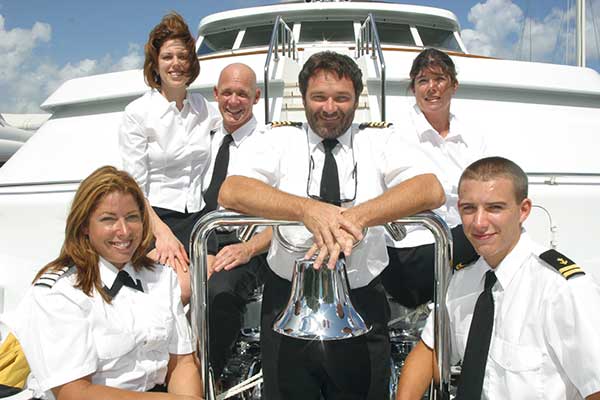

Yacht Crew Positions and Salaries
The organisational structure onboard a superyacht follows a strong hierarchy based upon a military model. Exact job duties and lines of authority are set and strictly adhered to. This hierarchy is followed on the vast majority of yachts; however, responsibilities of the crew on smaller yachts are often merged.
There are four departments on yachts with clear organisational structure:
- Deck (including Bridge) – Safety, passage delivery, maintenance of the yacht's exterior, guest outdoor activities
- Engineering – Safety and smooth operational running of the yacht
- Interior – Housekeeping, guest wellbeing, activities, accounting
- Galley – Food preparation, stock control, hygiene, galley maintenance
The top of the hierarchy on each yacht is the Captain , who reports to the yacht owner either directly, or through a representative or a yacht management company.
Salaries vary and depend on the yacht size, use, type and location, as well as the experience and qualification of the crew member. We included typical salaries of crew based on the data available from reputable industry sources, as well as our research of over 60,000 crew registered with us.
Deck Positions
The primary duty of the Captain is the overall safe manning and operation of the yacht. Yacht Captain is responsible for the vessel, yacht crew, owner and guests, including personnel management, shipyard/project management, legal and regulatory compliance, accounting, achieving owners' objectives, and answers to the owner regarding all decisions.
| Captain | €4,000 - €15,000 |
First Mate / Chief Officer
The First Mate or Chief Officer is the right hand of the Captain. Takes command of the yacht from Captain when required. Shares Captain's responsibilities as required.
| Chief Officer | €3,000 - €13,500 |
| 2nd Officer | €3,000 - €8,000 |
| 3rd Officer | €2,500 - €6,000 |
| Security Officer | €3,000 - €5,000 |
Bosun / Lead Deckhand
Bosuns are usually experienced Deckhands with additional responsibilities. They are in charge of Deckhands onboard the yacht and often spend a lot of time with guests during outdoor activities. The Bosun is normally the main tender driver.
| Mate | €2,500 - €6,000 |
| Bosun | €2,500 - €5,500 |
| Lead Deckhand | €2,500 - €5,000 |
Responsible for the maintenance of the exterior of the yacht and keeping it in pristine condition at all times. Deckhands also assist in maintaining, cleaning and operating yacht's tenders.
| Junior Deckhand | €2,000 - €3,000 |
| Carpenter | €3,000 - €4,000 |
Engineering Positions
Chief engineer.
Responsible for the Engineering Department and for all technical aspects of the boat and its equipment. The Chief Engineer's duties include overseeing all mechanical and electrical operations, ensuring all planned maintenance takes place and liaising with subcontractors.
| Chief Engineer | €5,000 - €15,000 |
Second / Third Engineer
The Second and Third Engineers report directly to the Chief Engineer. They assist in maintaining all mechanical and electrical operations of the yacht.
| 2nd Engineer | €3,000 - €10,000 |
| 3rd Engineer | €2,500 - €6,500 |
| Sole Engineer | €3,500 - €12,000 |
| Motorman | €2,500 - €4,000 |
ETO / AV/IT Officer
Electro-Technical Officer (ETO) and AV/IT Officer are in charge of daily maintenance of all electronic, computer, audio/visual and communications equipment and their efficient operation. This includes the radio, radar, telephones, satellite communications, navigation systems, computers, Internet connection, interior equipment (TVs, sound systems), etc.
| ETO | €4,000 - €8,000 |
| AV/IT Officer | €4,000 - €7,000 |
Electrician
The Electrician is responsible for maintenance of all electrical circuits onboard the vessel, circuit breakers, switches, lighting, batteries, etc.
| Electrician | €4,000 - €6,500 |
This is an administrative position on large yachts. The Purser is responsible for all operations in the interior department, including inventory, purchasing, provisioning, accounting, organising guest activities, and assisting the Captain with the yachts paperwork.
| Purser | €5,000 - €9,000 |
Chief Steward(ess)
Duties are similar to those of other Steward(ess)es onboard the boat, but on a more senior level, including managing the interior department and training. Small yachts with less crew do not have a Purser. The Chief Steward(ess) is in charge of all the responsibilities normally carried out by the Purser on large yachts.
| Chief Steward(ess) | €4,500 - €8,500 |
| Interior Manager | €4,000 - €8,000 |
| Head of Servicer | €4,000 - €7,000 |
| Head Housekeeper | €3,000 - €5,500 |
| Spa Manager | €3,500 - €5,500 |
Steward(ess)
Steward's or Stewardess's main responsibility is to maintain the interior of the yacht and provide the highest standard of care to the owner and guests. They serve food and drinks, prepare guest activities, pack and unpack luggage and are on call for anything that the guests want anytime day or night. On some yachts, they help the deck crew moor the yacht.
| 2nd Steward(ess) | €3,000 - €6,500 |
| 3rd Steward(ess) | €2,500 - €4,000 |
| Spa Steward(ess) | €3,000 - €4,000 |
| Service Steward(ess) | €2,500 - €5,000 |
| Housekeeping Steward(ess) | €2,500 - €4,000 |
| Laundry Steward(ess) | €2,500 - €4,000 |
| Sole Steward(ess) | €3,000 - €6,000 |
| Junior Steward(ess) | €2,000 - €3,500 |
| Butler | €3,500 - €6,000 |
| Stew/Deck | €2,500 - €4,000 |
The Head/Executive Chef onboard a luxury superyacht is a culinary trained professional responsible for the overall management of the galley department on larger yachts, including guest and crew meals, provisioning, food safety, maintaining strict hygiene standards and financial/budgetary administration.
| Head Chef | €6,000 - €10,000 |
Assists the Head Chef in all aspects of galley duties. The Sous Chef may be required to independently provide crew meals or guest meals at the direction of the Head Chef.
| Sous Chef | €3,500 - €8,000 |
Crew Chef / Cook
Large yachts employ a separate crew and guest chef. The Crew chef provides meals for the crew.
| Crew Chef / Cook | €3,000 - €5,000 |
| Sole Chef | €3,500 - €9,000 |
| Stew / Cook | €2,000 - €4,500 |
Other Positions
Many yachts, especially the large ones, have several additional positions. These are often combined with primary roles, e.g. Stewardess / Masseuse or Deckhand / Dive Instructor . The most common are:
| Beautician | €3,000 - €4,000 |
| Hairdresser | €3,000 - €4,000 |
| Massage Therapist | €2,000 - €4,500 |
| Nurse | €3,000 - €4,500 |
| Dive Instructor | €3,000 - €6,000 |
Career Advice:
Email address:
Remember me Forgotten password?
Password Reset
Enter your email address and we will email you a password reset link.
Email address:

Yacht Crew Salaries: Complete Guide to What Yacht Crew Earn
It’s no secret that the impressive yacht crew salaries attract most people into the exclusive yachting world.
Junior deckhands or stewardesses can earn starting salaries of $3000 per month. With a few years of experience and some courses to back you up, this amount moves up towards $4000-$4500 per month!
In order to compile this superyacht crew salary guideline, I have taken 10 of the top yachting platforms and used all of their data, combined with my personal experience, to reach an average salary expectation for each position.
Table of Contents
How Much do you Make Working on a Yacht?

Yacht Captain Salary
- 20m-30m: $4000-$7500
- 30m-40m: $5500-$9500
- 40m-50m: $8000-$15000
- 50m-70m: $13000-$19000
- 70m+: $16500+
Requirements of a Yacht Captain
- Years of experience needed: 3-5 years of experience as Chief Officer/Mate and more than 5 years of experience as a Captain for larger yachts
- Minimum level of Qualification: 200ton licence which allows you to drive vessels below 200tons
The Captain has the highest level of responsibility onboard the yacht and hence they earn the most out of all the yacht crew salaries.
Captains are accountable for the overall safety of the yacht, crew members and guests.
They also handle daily operations of the yacht, guests, and owner liaison. They deal with management companies, port control, budgets, human resources, and many more tasks and logistics that make the job demanding and stressful.
On top of this, Captains are required to hold high levels of certifications depending on the size of the yacht they are driving.
Yacht Captain salaries can sky rocket with higher levels of qualifications.
If you are looking to become a Yacht Captain one day I recommend looking into the courses required so you can get started with licenses and sea time. It takes time to get there, but when you do it will be worth it.

Chief Officer Yacht Salary
- 30m-40m: $4000-$6000
- 40m-50m: $4500-$7500
- 50m-70m: $5500-$9000
- 70m+: $8000+
Requirements of a Chief Officer
- Years of experience needed: 3-5 Years
- Minimum level of qualification: Officer of the Watch
The Chief Officer is second in command to the Captain and is responsible for carrying out the Captain’s standing orders.
On smaller yachts, the Chief Officer is referred to as the Mate.
The Chief Officer is responsible for carrying out the safety duties onboard and assisting in the bridge with paperwork and navigational planning.
The Chief Officer is also responsible for leading and managing their deck team, ensuring crew are following their duties as well as managing the water sports and guest activities.
The salary of a Chief Officer depends heavily on the license held.

Bosun Yacht Salary
- Years of experience needed: 2-3 years
- Minimum level of qualification: Yacht Master Offshore
- A yacht Bosun salary can vary between $4000 and $6000.
Responsibilities of a Bosun
The Bosun is essentially the Lead Deckhand onboard. A lead deckhand salary on a larger vessel will be similar to that of a bosun salary on a smaller vessel.
This is an opportunity to step up from being a deckhand and gain some experience in a leadership role. This position is in place for larger yachts so that when the Officer is busy with bridge duties, someone is in charge on deck.

Yacht Deckhand Salary
Years of experience needed: 0
- Minimum level of qualification: None needed, however Power Boat Level 2 and Yacht Master offshore will put you at a great advantage
- Entry-level yacht crew salaries start at $3000 and can go as high as $4000/$4500.
Responsibilities of a Deckhand
A Deckhand is an entry-level role on a yacht.
You need to spend a few years (or less) as a Deckhand in order to learn and gain experience so that you can step up in the ranks and obtain your licenses.
This role will be very hands-on in maintaining the exterior of the yacht. Duties will include cleaning, polishing, varnishing, sanding, caulking, and any other maintenance work required.
Chief Steward / Chief Stewardess Salary
- 30m-40m :$4500-$5500
- 40m-50m :$5000-$7000
- 50m-70m- $5500-$8000
- 70m+: $7500+
Responsibilities of a Chief Stewardess/Steward
- Years of experience needed: 3-5 years
- Minimum level of qualification: Depending on the size of the vessel you may need courses such as Food Hygiene and Safety, Silver Service, WSET, or a Purser course
The Chief Stewardess or Steward is responsible for all the interior operations of the yacht .
They are responsible for managing the interior team, and ensuring the interior of the yacht is maintained to the highest standards. Besides cleaning and laundry schedules , this also includes provisioning for crew and guests, budgeting, accounting, and training of junior crew.

Steward or Stewardess Yacht Salary
- Minimum level of qualification: Depending on the size of the vessel you may need courses such as Food Hygiene and Safety and Silver Service
- Salaries start at $3000 and go up to $6000
Responsibilities of a Steward or Stewardess
A Stewardess/Steward is an entry-level position working within the interior of the yacht.
There are rankings within the interior (2nd, 3rd, 4th Steward/Stewardesses). As you spend more time in the industry, you will be promoted to higher ranks, and with that will come a better salary and more responsibility.
This role covers a range of tasks, including but not limited to housekeeping, laundry, bartending, table scaping, floral arrangements, serving, and hosting guests.

Engineer Yacht Salary
- 20m-30m: $4000-$5000
- 30m-40m: $4500-$6500
- 40m-50m: $6000-$8000
- 50m-70m: $7500-$11000
- 70m+: $9000+
Requirements of an Engineer
- Years of experience needed: 2-4 years in an engineering role onboard as Deck/Engineer or relevant land-based experience
- Minimum level of qualification: AEC
The Engineer onboard is responsible for all mechanical functioning and maintenance of the vessel. This is a very technical role that can pay well as you gain experience and obtain your licensing.
Yacht Chef Salary
- 20m-30m: $4000 – $5000
- 40m-50m: $5500 – $75000
- 50m-70m: $6500-$9500
Requirements of a Yacht Chef
- Years of experience needed: 3-5 years depending on previous experience
- Minimum level of qualification: Food Hygiene and Safety Level 2
The Chef is responsible for feeding the crew 2 to 3 healthy and sustainable meals a day. They are of course required to prepare meals for guests when onboard to the highest of standards.
In their day-to-day tasks, they will be responsible for their own provisioning of the galley, maintaining stocks, cleanliness, and hygiene of the galley.
The salary of the Yacht Chef varies depending on qualifications and experience.

Yacht Crew Salaries for Private vs Charter Yachts
There are two types of super yachts that require crew: Private and Charter yachts. The salaries for yacht crew differ slightly between the two.
Private Yacht
A private boat is owned by a single person or family who uses the yacht for their own purposes. They don’t charter it out and you can expect to have the same guests onboard for the duration of your contract.
The benefit of these programs is that you get to know your guests well so you may find it easier to manage their wants and needs.
You may also benefit from traveling to off-the-beaten-track locations as I have!
For yacht crew working on these private boats, you will usually not receive charter tips.
Charter Yacht
A charter boat is one that gets chartered out by guests. This operates as a business and also means you will have different guests for every trip.
If you work on a charter boat you can expect to receive charter tips at the end of each charter. These are usually 10%-20% of the charter fee!
Considering these tips can be anywhere from $2000-$5000 per week depending on the size of the yacht, charter boats offer great earning potential and can skyrocket your salary as a yachtie.

Hi, my name is Lisa, a Chief Stewardess in the yachting industry with 10 years of experience, as well as 8 years of hospitality experience prior to that. Being in the yachting industry has been a whirlwind of adventure, growth, challenges and some of the best experiences of my life, and I am excited to share my knowledge and experiences with all of you.
How to Write the Perfect Yacht CV [With Template]
A day in the life of a yacht stewardess.
The Ultimate Guide to Yacht Crew Salaries
- by yachtman
- September 16, 2023 August 26, 2023

Yacht crew salaries – a topic of intrigue for many. If you’re asking yourself how much these professionals make, this guide is for you. Here, you’ll find all you need to know about yacht crew salaries.
Factors like the size and type of the yacht, its location and cruising itinerary, all influence pay rates. Moreover, experience and qualifications of the crew matter too when it comes to salaries.
In addition to the usual suspects, there are other unique details to yacht crew salaries. For example, some yachts reward their crew for excellent service or guest feedback. So hard work can bring you more than just a base salary.
Let me share a true story. Sarah is a highly experienced chef aboard a luxury superyacht in the Mediterranean. With her culinary skills and extensive training, Sarah earns a salary that reflects her expertise and talent.
Yacht crew salaries are a complex mix of vessel type, location, qualifications, and performance-based rewards. By exploring this guide, you’ll gain valuable insights into this fascinating aspect of the yachting industry. Let’s get started!
Understanding the yacht crew salary structure
Salary structure for yacht crew is key to understand when wanting a career in the yachting industry. See the following breakdown of positions and their corresponding average monthly salaries:
| Position | Monthly Salary (Average) |
|---|---|
| Captain | $10,000 – $20,000 |
| First Officer | $6,000 – $12,000 |
| Chief Engineer | $8,000 – $15,000 |
| Deckhand | $3,000 – $5,000 |
| Steward/ess | $3,500 – $6,500 |
| Chef | $4,500 – $10,000 |
Aside from these positions, experience, qualifications and yacht size can affect salaries. Gratuities can boost earnings too.
It’s important to be aware of trends when it comes to salary structure. Demand for experienced crew has been growing due to luxury yacht vacations. Salaries have also been rising.
It’s essential to know the yacht crew salary structure if you want to pursue a career in the yachting industry. Knowing average salaries and keeping up with trends will help you make smart career decisions.
Factors that influence yacht crew salaries
Various factors impact yacht crew salaries, like experience, job position, and yacht size/type . Experience enhances earning potential, while captains/engineers earn more than deckhands/stewards. Larger yachts often offer higher wages, and yacht type impacts specialized skills compensation. Certifications, language proficiency, and additional skills also factor in. According to SuperYachtTimes, certain destinations offer more competitive remuneration packages due to market demands and living costs variations. When considering a career in this field, take these factors into account to shape your earning potential.
How to negotiate yacht crew salaries
Here’s a guide to help you negotiate yacht crew salaries and get the best pay package:
- Do Research : Learn the industry standards for yacht crew salaries. Look into job roles, experience levels, and vessel types to set a benchmark.
- Assess Yourself: See how your skills, qualifications, and experience compare to other crew. Show any special strengths or certifications that could get you a higher salary.
- Get Ready to Negotiate: Prepare evidence for your desired salary range. Be ready to show your successes, awards, and extra value.
- Pick the Right Time: Time is key when negotiating salaries. Look for moments when your employer is okay with it, like during reviews or contract renewals.
- Show Your Case: During talks, explain why your salary should be higher, but stay professional and respectful. Highlight how you’ve helped the team or operations.
- Look at Non-Financial Benefits: If a raise isn’t possible now, try longer vacations, better housing, or professional development to boost your package.
Remember, negotiation is an art and needs both parties’ needs and expectations. By following these steps and customizing them to you, you’ll ace salary talks with confidence.
Pro Tip: Stay open to compromise, but aim higher than your target salary range to have some room to move without undervaluing yourself.
Expected salary ranges for different yacht crew positions
Salaries for yacht crew members vary greatly , depending on their position and experience. Here’s a look at the expected salary range for different roles in the yacht industry:
| Position | Min. Salary/Month | Max. Salary/Month |
|---|---|---|
| Captain | $8K | $25K |
| Chief Officer | $5.5K | $12K |
| Chief Engineer | $6K | $15K |
| Chef | $4K | $10K |
| Steward/ess | $2.5K | $6K |
| Deckhand | $2K | $5.5K |
Note: These figures are estimates, and can change due to yacht size/type, location, and individual skills/certs.
To increase earning potential, get specialized training/certs related to your role. Qualifications make you more appealing to employers. Network within the industry. Go to events and join pro orgs – meeting people who can give valuable connections. Building relationships with captains/brokers can get you better jobs with higher salaries.
Maintain professionalism and dedication at work. Yacht owners value crew members who show reliability and hard work. Going above and beyond can help you stand out when it’s time for promotions/salary negotiations.
By following these tips and investing in your skills/network, you can make the most of the yacht industry.
Tips for career advancement and higher salaries in the yacht industry
Seek out chances to advance your career, such as going to industry conferences or getting certifications. Make connections with important members of the yacht industry, both on and offline. Doing this can give you access to job openings and mentors. Show off your skills through a resume and cover letter when applying for jobs. Showcase experiences and accomplishments that will make you attractive to employers. Be open to taking on different jobs or tasks to get varied experience and make yourself more marketable.
In addition, stay informed about current industry trends. Find out about new tech, regulations, and best practices. This way, you’ll be seen as an invaluable asset to the yacht industry.
As an example, Sarah started as an entry-level stewardess but quickly rose through the ranks. She was recognized by her co-workers and bosses. In a few years, Sarah became chief stewardess on a top yacht. She was successful due to her excellent skills and adaptability. Now, Sarah earns higher salaries and has more opportunities for career advancement.
By following these tips, as well as being determined and hardworking, you can enhance your career prospects in the yacht industry and make more money.
Analysis of yacht crew salaries shows insights, both for inexperienced and experienced crew members. High demand for yachting professionals has created competitive compensation packages, plus yearly increments and benefits like accommodation, travel allowance, and food. Salary structures vary based on factors like experience level, yacht size/type, job role, and location.
It is vital to look at certifications and specialized skills for understanding crew members’ earning potential. Get additional qualifications like STCW certificates or culinary training to increase the chances of getting higher-paying jobs. Positions like diving instructors or onboard beauty therapists come with attractive remuneration packages.
To not miss out on great opportunities, stay up to date with industry trends. Network with fellow professionals through conferences or online platforms. By staying connected and informed, you can maximize your earning potential .
Frequently Asked Questions
FAQ 1: What factors determine yacht crew salaries?
Answer: Yacht crew salaries are determined by various factors such as experience, position, size and type of yacht, level of qualification, location, and the owner’s budget.
FAQ 2: What are the typical positions and salary ranges in the yacht industry?
Answer: Typical positions in the yacht industry include captain, first mate, chef, stewardess, and deckhand. Salaries can vary significantly, with captains earning $80,000 to over $200,000 per year, while deckhands may earn $30,000 to $50,000 per year, depending on experience and other factors.
FAQ 3: Are there any additional factors that can affect yacht crew salaries?
Answer: Yes, additional factors can include bonuses, tips, benefits, overtime pay, and the length of the working season. These factors can significantly impact the overall salary package for yacht crew members.
FAQ 4: Are there opportunities for career advancement and salary growth in the yacht industry?
Answer: Absolutely! Yacht crew members can advance their careers and increase their salaries by gaining additional qualifications and experience. Progressing to higher positions such as chief stewardess or captain can lead to higher income and better job prospects.
FAQ 5: Do yacht crew members receive any additional benefits besides their salaries?
Answer: Yes, besides their salaries, yacht crew members often receive additional benefits such as free accommodation and meals onboard, health insurance, retirement plans, transportation allowance, and the opportunity to travel to exotic locations.
FAQ 6: How can I find accurate and up-to-date information about yacht crew salaries?
Answer: It is recommended to consult reliable sources such as industry publications, yacht crew agencies, and professional associations specializing in the yacht industry. They can provide accurate and up-to-date information on yacht crew salaries.
Leave a Reply Cancel reply
Your email address will not be published. Required fields are marked *
Save my name, email, and website in this browser for the next time I comment.
Essential Guides
Ocean Mapping
New to Yachting
How to use the data presented here
The table has been drawn up with the information collated with figures from the past year within various yacht departments. Please note that they an indication only of starting salaries and the actual salary will vary depending on multiple factors.
Many elements need to be taken into consideration with regards to yacht crew salaries and not just the size of the yacht. The type of yacht (motor or sail), its usage (private, charter or both) and cruising schedule will influence the salary offered. Additionally, key elements of the candidate’s profile must also be reviewed, what is their previous experience, how long have they been in a particular role, have they recently acquired a new qualification, and do they have a specialised skill set that will influence the salary negotiation?
The highlighted section corresponds to yachts who offer a scheduled leave or rotational package.
Salaries here need to be modulated in accordance with the type of rotation offered, 5:1; 3:1 or 2:2 for example. There may be several different rotational schemes on a particular yacht, 5:1 for the junior crew, 3:1 for the intermediary position and full rotation for positions of responsibility.
The rotational salary is generally only a reduced monthly reduction (between 10 and 20%) and allows for a larger pool of candidates who are fully committed to the yacht, its programme and owner.
For many key roles, professional qualifications are the basis to establishing a guideline salary, notably in the Engineering and Officer’s Department.
Following the effects of the Covid-19 pandemic on the yachting industry in 2020, the past 2021 was considered the year of revival for yacht crew placement.
With regards to salaries, the market saw a return to stability and no major new trends were recorded. There is always increased pressure to offer a scheduled leave or rotational scheme that now starts with yachts in the 40 to 50 metre range.
HOW MUCH DOES YACHT CREW EARN
Yacht crew salary guide.
The yachting industry is more appealing than ever, but it comes with its own set of challenges. With so many candidates available, the task is to match the right talent with the right yacht efficiently.
In this evolving market, crew members are prioritising a balanced work-life dynamic. While salaries and leave packages in yachting are usually competitive, flexibility is now crucial for attracting top-notch crew. Offering more flexibility in leave allows for a broader selection of candidates who are dedicated to the yacht, its schedule and its owner.

Key trends in superyacht crew recruitment
Offering Competitive Compensation Packages
Salaries and leave packages remain a crucial factor in attracting skilled crew members. Highly qualified crew are seeking packages that accurately reflect their expertise, certifications and the value they bring to their roles onboard.
Preference for Work-Life Balance
The desire for a better work-life balance continues to be prevalent among superyacht crew. This includes preferences for rotational positions that allow for scheduled time off, as well as yachts with itineraries that offer a good mix of guest-on and guest-off periods. Employers are responding by adjusting leave schedules and offering more flexible contracts to attract and retain top talent.
Emphasis on Soft Skills
While technical prowess remains crucial, there's a growing recognition of the importance of soft skills. Attributes such as teamwork, communication, and adaptability are increasingly emphasised during the recruitment process, reflecting the collaborative nature of yacht crew work and the premium placed on guest experience.
Underscoring Sustainability and Environmental Awareness
With increasing awareness of environmental issues, conversations are developing around sustainable practices. This includes expertise in managing waste, reducing emissions and operating advanced environmental technology on board.
Deck Department
All the Captain and Officer salaries will depend on experience and maritime qualifications.
* On smaller yachts the First Officer is generally referred to as the Mate or First Mate. On yachts over 100m / 3000GT there are often two distinct roles for a First Officer and a Chief Officer.
** Specialised Deckhand positions will englobe a Deckhand Tender Driver, Kite Surfer, Carpenter, Diver etc.
Sole/Chief Engineer:
For 30m — 40m the salary is based on the candidates holding an AEC/Y4
For 40m — 50m the salary is based on the candidates holding a Y3 / SV Chief 3000kw
For 50m — 70m the salary is based on the candidates holding a Y2 / SV Chief 9000kw
For 70m — 80m the salary is based on the candidates holding a Y1 / SV Chief 9000kw
For 80m — 100m the salary is based on the candidates holding a Y1/Class I
For 100m+ the salary is based on the candidates holding a Class I
Second Engineer:
For 40m — 50m the salary is based on the candidates holding an AEC
For 50m — 70m the salary is based on the candidates holding a Y3 / SV Chief 3000kw and on rotation. If the role is permanent then an EOOW qualification is required and the salary would be 5 000—6 500€
For 70m — 80m the salary is based on the candidates holding a Y3 / SV Chief 3000kw
For 80m — 100m the salary is based on the candidates holding a Y2/Class II
For 100m+ the salary is based on the candidates holding a Class I/Class II
Third Engineer:
For 70m — 80m the salary is based on the candidates holding a AEC
For 80m — 100m the salary is based on the candidates holding an EOOW - equal rotation or 4:2 for example
For 100m+ the salary is based on the candidates holding an EOOW - equal rotation or 4:2 for example
For 80m — 100m the salary is based on the candidates holding a STCW III/4
For 100m+ the salary is based on the candidates holding a STCW III/4
Please note that the salaries below are an indication only of starting salaries and that the actual salary will vary depending on multiple factors; job specific skills, professional qualifications and experience.
YPI CREW now offers a bespoke service for our yacht clients to assist with salary reviews and comparative analysis. Contact [email protected] for any further information.
Download the full YPI CREW recruitment market report
Download the YPI CREW Recruitment Market Report for an in-depth analysis of current trends in superyacht crew recruitment. Gain valuable insights into the market dynamics and trends specific to each department, providing a comprehensive overview of the industry landscape.
Are you looking for yacht crew for your yacht?
Contact our recruiters who will strive to find the perfect fit to your existing crew by presenting suitable, available and interested candidates, who will be pre-interviewed and credentials checked.
You can get in touch with us today by clicking here .
Explore the latest in yachting

YPI CREW Announces its 2024 Superyacht Recruitment Market Report

Embarking on an Engineering Career in Yachting: Crafting Your CV

YPI CREW is a proud sponsor of the ‘Seas the Day’ Ocean Rowing Team

YPI CREW TEAM
Meet our recruitment team.

YACHT CREW GUIDES
Download free yachting cv templates, let’s get started. call us on +33 (0)4 92 90 46 10 or email us..

Engineering Department
Chef department.
* No yachting experience
** Rotational positions start at 6 000€ while non-rotational positions start at 7 000€ *** Combined Cook/Stew or Cook/Deck role **** Lower end refers to crew with no yachting experience
***** Rotational positions start at 4 500€ while non-rotational positions start at 5 000€
More and more yachts, from 30m+, are offering rotation at all levels in the galley in order to secure the best candidate on the market.
Interior Department
Specialist Positions
30m — 40m
40m — 50m
50m — 70m
70m — 80m
80m — 100m
Chief Officer
First Officer*
Second Officer
Third Officer
Specialised Deckhand**
Deckhand Junior
4 500—6 000
45–60 days
3 500—4 500
2 800—3 000
45 days
6 000—9 000
3 500—5 500
8 000—13 000
45–60 days or equal rotation
5 500—7 000
50–60 days
3 800—4 000
9 000—18 000
60-90 days or equal rotation
6 000—7 500
5 000—6 500
5 000—5 500
60–90 days
14 000—20 000
7 000—9 500
5 500—6 500
61-90 days or equal rotation
4 000—5 000
3:1 rotation
90 days or 3:1 rotation
15 000—23 000
8 500—11 000
62-90 days or equal rotation
Discretionary
Equal rotation
9 500 + discretionary
7 500—10 000
6 500—7 500
4 500—5 500
3:1 rotation or equal rotation
Salary (€)
Chief Engineer
1st Engineer
Second Engineer
Third Engineer
ETO & AV/IT
4 000—6 000
Non-rotational
5 000—8 000
Non-rotational or equal rotation
7 500—10 000+
6 500—7 000
Non rotation or rotation
6 000—7 000
11 000—15 000+
7 000 — 8 000
Non-rotation or rotation
3 200—4 000
7 000—8 000+
13 000—15 000+
8 500—10 000
8 000—10 000
Head Chef/Sole Chef
4 500*—5 500
5 000—6 000
2:2 rotation or non-rotational
6 000—8 500
4 000—5 000***
6 000**—9 000
4 000****—6 000
4 500*****—6 000
2:2 rotation
Head of Service
Head of Housekeeping
Experienced Stew 1–3 years experience
Junior Stew 0–1 years experience
3 500—4 000
2 800—3 300
4 000—5 500
3 000—4 500
3 000—4 500
4 500—6 000
3 800—4 250
6 500—8 000
90 days+ or equal rotation
5 500—8 000
60 days+, 90 days+ or equal rotation
4 250—5 500
60 days+ or 90 days+
7 000—8 000
equal rotation
90 days+ or equal rotation
4500—5 500
8 000—9 500
7 000—8 500
5 000—6 000
Spa Manager (with yachting experience)
Spa Therapist (with advanced level training)
Masseuse / Beautician (with basic training courses)
Personal Trainer
Laundry Master
3 300—4 500
4 000—4 500
4 000—5 000
90 days + or equal rotation
Are you ready to find your new ideal job on board a yacht?
Become a member of YPI CREW and connect with our recruiters so they can guide you through your job search.
Each of our recruiters is specialised in crew placement for a particular department and they will do their best to get you an interview on board a yacht. They will also advise you on how to best present your experience and skills and prepare for a yacht job interview.
Our Mission, Vision and Values
Mlc 2006 compliance, essential guides, yacht crew positions.
Interior Crew
Spa Manager
Spa Therapist
Personal Trainer & Yoga Instructor
Hairdresser
Mandatory Certificates
B1/b2 visa information, how to write a memorable cv, how to prepare for an interview, yachting seasons, yacht crew salary guide, is yachting the right choice for me, cv templates, ocean mapping, new to yachting.
+33 (0)4 92 90 46 10
- Yachting for beginners
- Owning a yacht
- Motor Yachts
- Sailing Yacht
- Indian Ocean
- Mediterranean
- Buying or Selling a Yacht
- Yachting Events
- FAQ – Luxury Yacht Charter
- FAQ – Buying a Yacht
- FAQ – Sell your Yacht
- How Much Does It Cost To Charter A Luxury Yacht?
- All our Blog Post & News

Yacht crew positions : Hierarchy, Missions & Salaries explained

Like any well-run hotel, restaurant, or other luxury service, a crewed yacht needs organized structure and good management. Whether you’re staffing your own luxury vessel or looking for an exciting career working and traveling the world, you need to know how this structure works, and what you can expect to pay or earn and do in the various roles on board.
Every yacht is a little different, and organization may reflect the style of the captain or the demands of the owner. But the same jobs need to be done on almost every boat. Organized with ranks, heads of each division report to the Captain. It’s not a military-style organization, but there are parallels with merchant marine grades and structures.
Smaller yachts need fewer crew, and staff may wear multiple hats that cross more traditional divisions and may combine some jobs with others. Large yachts have more distinct divisions or subdivisions, with more specialization to divide tasks and manage staffing. The core skills are the same, but finding staff with the right blends to do the jobs is key. Crew with broader skills are highly sought after.
As a yacht owner, you shouldn’t have to worry about day-to-day management decisions or organizing all this. That’s why you have a captain, and it’s better to leave staffing decisions entirely up to him or her. But it’s still important to know what it is people you’re hiring do, why they’re there, and how many you need. You don’t want too many crew, or to be short-handed. An understanding of what your yacht needs helps you talk to the captain to keep your yacht running how you want it.
For those looking to break into yacht crew work, consider your skills and strengths, and what jobs appeal to you. You’ll need training before you work, and you can direct your job path through the training you seek. Your goal is a suitable position on a well-run yacht, so make yourself the most attractive candidate possible.
Yacht Work Life
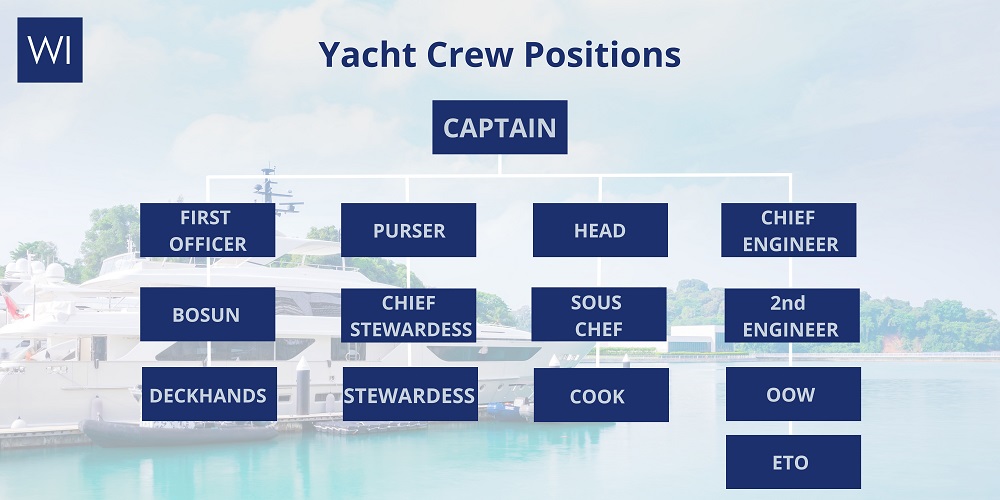
Working on a yacht is also living on the yacht. Crew must have a space to sleep, food, and all the basics that any employee needs. Large yachts have space reserved for crew, and owners looking for quality crew should provide good working and living conditions. Your crew takes care of you, and you should take care of them.
Depending on where a yacht operates or what flag she flies, a variety of labor laws or rules may be in effect. These requirements may be for work visas, contracts and written agreements, and compliance with merchant and ship crew treaties and laws. Be prepared to have work and non-disclosure agreements between yacht and crew, though a few yachts skip this.
Seasonal Jobs
Many yacht positions are seasonal. Year-round employment is more likely for senior crew like the captain and department heads, but not all yachts see year-round use. And some yachts may use different crew in different locales between seasonal moves.
Any job listing should give seasonal information, with geographic information, the length of the season, and the prospects for year-round positions and repeat employment.
Hours, Salaries, and Expectations
Yacht crew is a service job at its core, and every yacht owner is looking for service-oriented people who understand how to deliver a hotel-quality living and restaurant-quality fine dining. Work experience in luxury hotels and restaurants is a big plus for some jobs, and makes breaking into yacht work easier.
Yacht work can be very demanding, with periods of intense work when the owner and guests or a charter party is on board. Long days aren’t uncommon, but often balance with slack time when the boat is empty of passengers. There is always work to be done, but there’s usually a chance for time off.
Most salaries are monthly, since many positions are seasonal. Pay ranges are commensurate with experience, rank, and responsibility. Private vessels usually offer higher base pay, as charter crew can earn tips on top of their base salary. Because of the demands of the lifestyle, compensation is good and you have minimal living expenses on board.
Benefits and Time Off
Because so many jobs are seasonal and may occur in different countries and locations, benefits offered to yacht crew vary widely. But it is not uncommon for crew to be offered health and accident insurance and a flight to the vessel. Living on board, you’ll get food, rooming (usually shared), basic toiletries, uniforms, and laundry. Yachts with a longer view may offer additional training to long-term prospects.
Time off is usually linked to boat use, and may be sporadic in-season or when the boat has the owner and guests on board. There will always be some time off, but it may be between very intense work periods.
Most crew jobs have an employment contract that meets the Maritime Labour Convention 2006 (MLC). This should spell out the contract period and duration, as well as salary, leave and time off, probationary periods, repatriation policies, and any other crucial details to meet the minimum international standards of crew welfare.
This contract should also contain shipboard policies on confidentiality and non-disclosures, drug and alcohol use on board, personal hygiene expectations, interpersonal relationships, and dispute resolution. Job expectations and requirements can also be included, with specific language about roles, tasks, and cooperation between divisions.
Note that all crew agreements will explicitly prohibit drug use on board, most limit alcohol consumption and ban hard liquor on board, and many boats have policies prohibiting intimate personal crew relationships. Because the crew is living on board full time and in close quarters, rules to maintain decorum and crew harmony may be in writing.
Training & Certificates
Two key certifications are required for yacht crew. Employers look for the STCW (Standards of Training, Certification and Watch-keeping for Seafarers) and the ENG1 (Seafarer Medical Certificate). Insurers generally require crew to have these two certifications or the equivalent.
The ENG1 isn’t a class. It’s a medical exam to ensure that the crew is physically fit to serve at sea and has no underlying conditions that may arise far from help. It’s best for prospective crew to secure the ENG1 before investing more time and money training.
STCW is a week-long class on the basics of onboard safety. This includes hands-on modules covering personal survival, fire safety, first aid and CPR, accident prevention, and security awareness. It needs to be refreshed every five years.
Shared, Hybrid, and Crossover Jobs
Larger vessels will have more defined duties and specific areas of responsibility. But smaller yachts may want the crew to have different roles in different situations. For example, a hybrid job description may read “3rd Engineer/Steward” and describe a role in engineering when the boat is empty but on inside crew when passengers are on board.
When hiring or seeking jobs be prepared to look for creative crossover skill sets to meet the needs of the vessel.
Extra Skills and Duties
Any extra skills outside the regular duties makes crew more attractive. From stewards who can teach yoga, give massages or play cocktail piano to deck crew who know how to water ski, SCUBA dive, or fish, anything that crew can bring to enhance the passenger experience adds value to the employee.
If you’re looking for a position, list the skills you’d be comfortable using. If a vessel owner is looking for something specific, spell it out and figure out how that special duty fits into the employee work day.
The Four Main Divisions

Most yacht crews break into four primary divisions which group related tasks and responsibilities together. While the grouping sounds like it’s by section of the boat, they’re really more functional. For example, stewards (Interior) will definitely serve meals, whether they’re in the main dining room or out on deck. Deckhands (deck) are going to be involved in painting, sanding, and varnish jobs anywhere on the boat.
The deck crew handles most of the exterior operations of the yacht, and runs it. Deck hands and crew keep the boat looking clean and shiny, and handling most vessel operations. This includes driving and operating the yacht, navigation, running all launches and ship’s craft, handling lines, and all maintenance and painting, washing, and shining.
2-Interior (or Inside)
Inside crew are primarily the stewards and housekeepers. Larger vessels will have a dedicated housekeeping staff separate from the stewards, but smaller vessels may not.
Stewards keep the interior clean, do all housekeeping, laundry, food and beverage service, cabin preparation, and anything else needed for the comfort of the passengers.
3-Engineering
Below decks, the engineering department ensures the safe and smooth running of all the ship’s machinery and electronics. Engineers are engine and systems specialists, and there will usually be a dedicated electronics expert. Most engineer jobs require professional training and certification.
Fine dining is a hallmark of the yachting experience, and a full-time galley crew prepares all meals for passengers and crew. The head chef plans the menus and provisions the boat, while junior chefs assist the head chef with meal preparation and keeping the galley spotless.
Yacht Job and Department Details

Departments are all organized in a hierarchy, with a department head reporting to the Captain. The clear chain of command makes for smooth operations, with all communications going up and down ranks. Junior staff will occasionally take instructions from other divisions as all crew is expected to help as needed. A captain or department head may organize staff differently, so reporting structures listed are guidelines only.
All salary ranges are monthly figures and are ranges based on yacht size and crew experience. Senior jobs on larger yachts have more responsibility than the same job title on yachts with smaller crews. Experienced crew are very desirable and can expect more pay for their positions.
Listed responsibilities are not exhaustive, and different yachts may allocate some jobs to different positions.
Read also: The yacht charter experience ladder
The Captain

The captain of the vessel is the overall decision maker for the yacht in all situations, including the safety of the vessel. The owner should leave the Captain responsible for operational decisions about hiring and staff and operating the ship. To become a captain requires years of experience and training, and a broad set of skills including yacht operations, personnel management, budgeting and finance. The captain works directly with the owner and owner’s representative, if the captain is not also acting as the representative.
On an organization chart, the Captain is usually placed in the deck division, but the Captain is always the senior-most crew on the yacht and all division heads report to the Captain.
Responsibilities include:
- Responsible for all navigation and running the yacht.
- Senior decision maker on all crew hiring.
- Manage repairs, refits, and yard work.
- Manage budgets and accounting. On larger yachts, this task ends more on the Purser, but the captain is always responsible.
- Ensure all paperwork, clearances, and legal requirements are completed.
- Primary contact with the owner or charter parties.
Reports to: The yacht owner
Salary Range: $6,000 to $22,000
The deckhands handle all the outside responsibilities of the ship, including cleaning and maintenance of the yacht and all the ship’s vessels and toys on board. Deck crew will have significant contact with passengers in this role, operating launches and delivering guests to and from shore and handling the toys.
All deck crew have watch responsibilities on passage, and daily responsibilities keeping the yacht pristine and clean. They will also do line handling and secure the yacht.
Deck department : Chief Mate/First Officer
The Chief Mate or First Officer is the second in command of the vessel, and left in charge when the Captain is not on board. The first mate has the requisite skills to stand in for the captain and run the yacht if needed and usually acts as the division head of the deck team.
The seamanship skills needed are similar to the Captain’s position.
- Primary safety officer for the yacht and all passengers and crew.
- Supervise and manage all operations on deck.
- Bridge watches on passage.
- Passage planning and navigation.
There may be additional mates on larger vessels, these 2nd, 3rd, etc. mates have similar responsibilities on rotation. But the first mate is senior and always second in command.
Reports to: Captain
Salary Range: $4,000 to $9,500 (First mate)
Second and more junior mates may earn $2,000 to $4,000
Deck department : Bosun
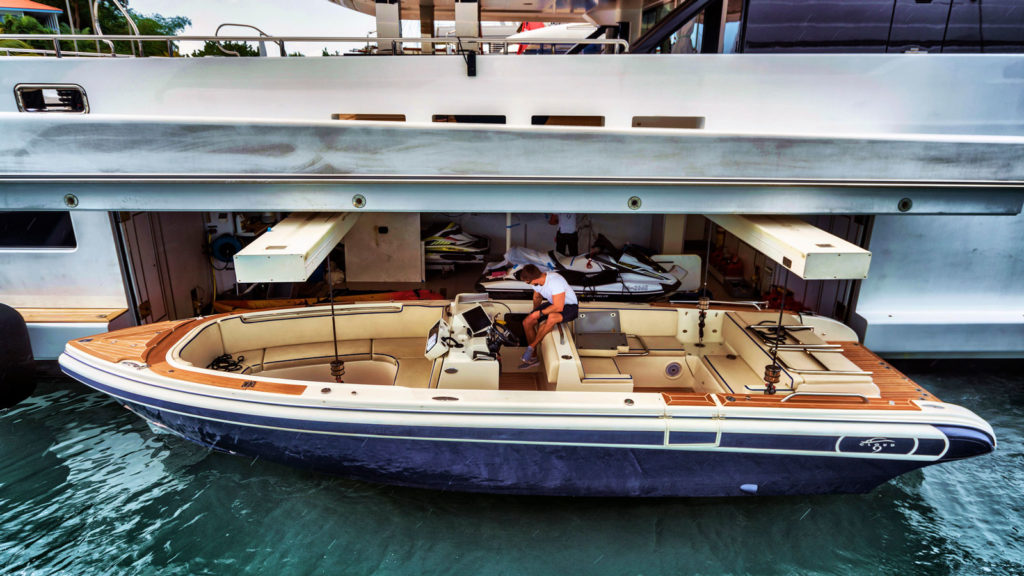
The Bosun is the senior deckhand and manages the junior hands on board. This will usually be the most experienced hand on board.
- Organizing all operations on deck.
- Coordinating the use, storing and launching of the ship’s boats, toys, and equipment.
- Managing the passerelle, watching passenger safety.
- Contact point for guest service on boats, toys, and trips to shore.
Reports to: First mate
Salary Range: $3,000 to $5,000
Deck department : Deckhands

Deckhands are constantly busy with maintenance, cleaning, polishing, and assisting guests as needed. They will assist other departments as needed or given special duties.
- Daily cleaning of the yacht’s exterior.
- Painting, varnishing, polishing.
- Line handling.
- Launching and operating dinghies and tenders.
- Repairs and carpentry.
- Helping guests as needed – everything from handling baggage and gear to embarking and disembarking.
Reports to: Bosun
Salary range: $1,300 to $3,000
Though every position on a yacht is service-oriented, the interior or inside crew provides the primary customer service. They will interact the most with the passengers daily, and they’re directly responsible for the quality of their experience on board.
Interior department : the Purser

The purser is the chief financial officer of the yacht and handles all the financial operations on board. Accounting, purchasing, payroll and hiring, and all money matters end up with the Purser. This is a senior staff position, and may be the interior department head. Smaller yachts may eliminate the purser’s job and add it to the captain’s and other senior staff duties.
Responsibilities Include:
- Accounting and bookkeeping for all financial transactions.
- Human resources and payroll.
- Handling logistics for all departments related to purchasing.
- Managing contracts.
- Event coordination, including off yacht bookings and payments.
- Primary administration of the boat’s business paperwork.
- Inventory and supply management.
Salary Range: $4,000 to $8,000

Interior department : The Chief Steward/ess

The chief steward or stewardess has primary responsibility for all service roles inside. Food and drink service, cabin preparation, and anything to do with helping the passengers be more comfortable and enjoy their stay. The chief steward will be inside crew with several years of experience.
The chief steward manages the interior staff, setting and enforcing vessel service standards. The chief steward ensures the crew delivers a five-star hospitality experience.
Chief Steward Responsibilities:
- Scheduling and training junior crew for meal and drink service and cabin preparation.
- Primary contact with guests for meals and drinks.
- Sommelier and wine service.
- Coordinate with the galley for meals and presentation.
- Decorate the interior, from flower arrangement to table settings.
- Arrange onshore activities and outings.
Reports to: Captain or Purser, depending on the yacht
Salary Range: $4,000 to $8,500
Stewards/Stewardesses
The stewards and stewardesses are the primary guest service staff. They will work closely with guests and passengers, and have daily contact with them as they meet most of their needs while on board.
Steward Responsibilities:
- Food and drink service.
- Room preparation and turndown service.
- Cleaning, polishing, housekeeping, and inside maintenance.
- Cabin detailing.
- Laundry, pressing, and folding.
- Help with outings, trips, debarkations.
Reports to: Chief Steward
Salary Range: $1,500 to $4,500
Housekeeping

Larger yachts may have a dedicated housekeeping and laundry staff. This will be part of the inside crew, under either the purser or the head steward. There may be a senior housekeeper, if there are more than one housekeeping crew on board.
Responsibilities are the cleaning and laundry portions of the steward’s job, and a laundry steward may spend most of her time inside the ship’s laundry.
An experienced Head of Housekeeping may earn from $4,500 to $7,000, while a Laundry Steward typically earns from $2,500 to $3,500.
Read also: CAN OWNING A YACHT TO CHARTER (REALLY) BE PROFITABLE?
Food service requirements on any yacht are high. Whether it’s a privately owned vessel or a charter, the expectations are always for top tier food service, with a variety of meals planned for the requirements of every passenger. Chefs and cooks prepare all meals on board for passengers and crew, but sometimes other interior crew may help with prep work or cleanup.
Smaller yachts have smaller galley crews, but the largest vessels may have an executive chef and several sous chefs. All chef positions require formal culinary training and experience, but cook positions are often entry level. Promotion from cook to chef is unusual without additional training.
Galley department : the Head / Executive Chef

On larger yachts, an Executive Chef will run the entire galley with the help of sous chefs and cooks. With an Executive Chef, there’s an expectation that the food and menus will be on a level with Michelin star-rated restaurants.
The executive chef brings a thorough understanding of food preparation and presentation, and moves food preparation past creative up to artistic. Job responsibilities are similar to a chef, but the job demands and the required experience and education are much higher.
Salary range: $7,000 to $11,000

The chef has overall responsibility for all meals on the yacht, from provisioning in remote places to hygiene and good safety. If there’s only one chef, she’s the head of the galley crew. Finding the best provisions in far away locations and making the best of local food availability is a major part of the job.
- Planning a delicious and varied menu for passengers.
- Sourcing all food and arranging transport to the yacht.
- Maintaining and operating within the galley budget.
- Preparing passenger meals with professional presentation and style.
- Cleaning and maintaining galley and galley equipment.
- Deliver menus and meals on time, while running an organized and spotless galley.
Galley department : Sous Chef
The sous chefs assist the chef in all aspects of running the galley, and may have independent assignments to plan and guest and crew meals. While not primarily responsible for provisioning, the sous chef will help with food selection, menu preparation, and planning. A sous chef must have formal culinary training.
Reports to: Head chef
Salary Range: $3,500 – $6,000.

Galley department : The Cook
Cooks may be entry-level positions or experienced, but do not require formal gastronomy education. They will assist the chef and sous chefs, cooking meals and dishes for guests and crew, helping with provisioning, and keeping the galley neat.
- Assist with provisioning and buying high-quality food from local sources.
- Follow all food handling and safety guidelines.
- Assist the head chef as needed, taking direction and guidance.
- Prepare guest and crew meals as required.
- Staying on top of galley inventories and supplies.
Salary Range: $2,500 to $3,500
Engineering

The engineering department keeps the yacht and all its systems working. Whether it’s the engines, electronics, air conditioning, or the plumbing – it’s up to engineering to keep it running.
There is considerable overlap with commercial shipping in the engineering field, as many of the same skills apply. And there is a broader range of qualifications and grades based on the size and power of the vessel. Job ratings may be set by required experience based on tonnage of ship or power of engines, with corresponding levels of pay and responsibility.
Unlike commercial shipping, engineers may get involved in other aspects of running the yacht, like helping with docking and water sports with mechanical toys.
Engineering certifications, training, ratings, experience and licensing are critical to hiring competent engineers, and for engineering crew it’s an important facet of career advancement. This is important for Chief and 2nd Engineers, which are often broken out by MCA (U.K. Maritime and Coastguard Agency) rating or other international equivalent.
MCA ratings for engineers Commercial and Private Yachts over 24m are:
Y4: Less than 200 Gross Tons and less than 1,500 kW engine power Y3: Less than 500 GT and 3,000 kW Y2: Less than 3,000 GT and 3,000 kW Y1: Less than 3,000 GT and 9,000 kW
There is also an unlimited rating for merchant vessels larger than the Y1 category. For discussing salary and responsibilities, we will include all ratings in one position description, but pay scales with the size of the yacht and any required higher ratings.
Chief Engineer
The chief engineer manages all aspects of keeping the yacht and its systems running. The chief engineer manages all the engineering staff, and directs all maintenance, repairs, troubleshooting and upgrades. This is a management position, but requires extensive hands-on technical experience and knowledge. Chief engineers on large yachts hold an MCA Y1 or Y2, smaller boats will have a lower rated chief and a smaller staff. Check Jooble.org to find abroad marine engineer vacancies.
- Provisioning, shopping, and stocking.
- Preparing passenger and crew meals.
- Following instructions and cooking under the direction of others.
- Galley cleaning.
- Follow food safety and storage procedures.
- Food pre-preparation.
Salary Range: $6,000 to $15,000
2nd Engineer
The second engineer is also a highly skilled position requiring a rating or license and several years of experience. This senior level engineer also needs knowledge of how to troubleshoot and maintain all yacht systems.
- Maintain and manage all engineering operations.
- Hire, train and supervise all engineers.
- Project manage all upgrades and retrofits, including managing budgets, contracts, and suppliers.
- Coordinate maintenance schedule for the entire yacht around the usage and seasonal schedules.
- Maintain costs and accounting for engineering operations.
- Design and handle all safety operations.
- Set and maintain standards for operations and cleanliness in the engine room.
Reports to: Chief engineer
Salary Range: $5,500 – $10,000
OOW (Officer of the Watch) Engineer
The OOW is a junior engineering position, but still licensed. There are two categories of OOW – MEOL (Marine Engine Operator License) and the more junior AEC (Assistant Engine Course). The overall responsibilities are similar, working to support the senior engineers and handle independent assignments. The AEC rating is entry level for licensed crew, but has training and certification.
- Support the chief in all projects.
- Maintain a clean, safe engine room.
- Perform all maintenance, troubleshooting and repair tasks as needed.
- Support motorized water sports.
- Occasionally assist with other vessel operations, like line handling.
Reports to: Chief Engineer
Salary Range, MEOL: $4,500 to $6,000 Salary Range, AEC: $2,500 to $3,500
Electronics/Technology Officer (ETO)
The ETO takes responsibility for all audio-visual and information technology on board. Ensuring passengers have access to the internet, movies, television, and music is a primary responsibility. This position carries a fair amount of passenger interaction, and an ETO needs good troubleshooting skills to go with customer service skills.
- Ensure all audio/visual and entertainment systems are always available for passengers.
- Assist passengers with personal technology and ship systems as needed.
- Conduct regular maintenance and upgrades of the network, information, and A/V systems around passenger schedules.
- Assist other engineers as needed, especially with electronic systems.
- Contribute as needed with other departments for boat and passenger operations.
Salary Range: $4,000 to $9,000
Junior Engineer
This is a lower or entry level position for someone with engineering skills but without formal licensing or certification. The junior engineer will help with safety and cleanliness, and assist in any engineering tasks as needed. The ability to solve problems and fix things opens this spot for anyone capable and willing to do the job.
- Help with cleaning, maintenance, and safety functions.
- Help anywhere needed on the yacht.
- Assist senior engineers as needed, taking direction and following instructions exactly.
- Constantly develop skills.
Read also: IS BUYING A BOAT A BAD IDEA?
Whether you are a yacht owner or considering entering this dynamic industry with an established and reliable crew, it is essential to have an understanding of the yacht’s hierarchical structure, mission priorities, and salary expectations. By doing your research on the complexity of yachting before hiring your team, you can confidently select the right group of experienced and qualified professionals for your needs. Staying up-to-date on top industry trends and knowing the capabilities of each type of yacht crew position will enable you to make sound decisions that support a safe and cost-effective journey. With quality personnel at your helm, you can cruise unhindered in luxury and explore new destinations with peace of mind.
Fractional Yacht Ownership : Everything you Need to Know
What is the best country to register your yacht offshore, you might also like.

What differentiates a yacht from a superyacht or a mega yacht?
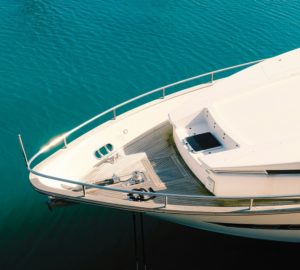
Chartering Requirements and Regulations: A Guide for Boat Owners

What are the Fastest Cruising Catamaran on the Market?

Yacht Crew Salaries By Position
Ever wondered what staff members aboard a luxury yacht charter make? Here’s a breakdown by position. Some may surprise you.
If you have ever binge-watched Below Deck, or daydreamed about working on a luxury yacht, you may have thought to yourself, “I wonder what they make?”. Many people across the world have jumped at the opportunity to rub elbows with the world’s elite while working aboard the most luxurious ships in the world.
If you have wondered what the salaries are for workers on a yacht, and want to take the next step toward a great mix of freedom and pay, joining a luxury yacht crew might be for you.
Crew jobs on yachts can be some of the most rewarding careers available, but they are also challenging. It is important to know what to expect when applying for a crew job. Here is a breakdown of what you can expect to find when applying for a yacht crew job.
Yacht Staff Departments
To understand the yacht crew job descriptions better, you have to understand the different departments in a yacht. These departments include:
- Deck – passage delivery, safety, outdoor guest activities, and exterior maintenance.
- Interior – guest wellbeing, housekeeping, accounting, activities.
- Engineering – smooth running of the yacht and safety.
- Galley – stock control, hygiene, food preparation, galley maintenance.
On any yacht, the captain is at the top of the hierarchy. They are responsible for reporting to the vessel’s owner via a representative or directly. Below are the job descriptions for yacht crew members in these departments.
Salaries will vary depending on the size, type, location, and use of the yacht. The crew’s experience and qualifications will also play a role in determining their salary.
Deck Department Roles
The captain’s job description includes: keeping the vessel safe and secure, ensuring that all crew members are doing their job, and reporting any safety concerns. Typically, this person will also be in charge of hiring other deck officers for specific duties. Depending on various factors, the captain could be paid $4,200 to $15,800 per month.
Although this an extremely high pay rate, it requires decades of experience typically. Being in charge of the safety of passengers, crew members and potentially a $50 million yacht is serious business!
Chief Officer/First Mate
Chief officers’ responsibilities include supervising the crew’s daily activities, maintaining duties and duties lists, and overseeing crew pay. This is also the person who will be in charge of hiring other crew members and managing the activities or watersports the guests would like to participate in. Typically, this person will make around $3,100 to $14,200 per month.
Second Mate
The second mate’s job description includes: being in charge of navigating the yacht and overseeing any repairs that may be needed. Typically, this person will make around $3,100 to $8,400 per month.
The third mate’s responsibilities include: handling deck chores and maintenance for the yacht. The salary is $2,600 to $6,300 monthly.
A bosun is in charge of safety and security, supervising diving operations and monitoring all deck equipment. They will also maintain the diving records whenever necessary. This person will make around $2,600 to $6,300 monthly.
Interior Department
A purser is responsible for hiring, training, and caring for all crew members. They are sent out to find candidates and supervise their performance in port and during sea trips. They are responsible for every operation in this department. Typical salaries go from $5,200 to $9,400 monthly.
Chief Steward
The chief steward is responsible for hiring, training, and supervising all crew members in the interior department. They will set up work schedules, determine pay scales and enforce penalties if they are not followed. Typical salaries go from $4,800 to $8,800 monthly.
The steward is in charge of the kitchen, taking orders and keeping track of all supplies. They unpack and pack the guest’s luggage and remain on standby at all times in case anything happens. Salaries go from $3,100 to $6,800 monthly.
Engineering Positions
Chief engineer.
He or she is in charge of the engine room and is responsible for ensuring it is operating smoothly. The chief engineer is responsible for providing services to all the other positions on board if needed. They will make around $6,300 to $15,600 monthly.
Second Engineer
As the second in command to the chief engineer, this person will be in charge of all engine room duties and services that need to be done. Salaries are typically around $3,200 to $10,500 per month.
ETO Officer
An ETO officer will oversee all electrical and electronic equipment, including everything from the GPS to the yacht’s peripheral devices, lighting, and communications equipment.
They will be in charge of setting up the systems, testing them during repairs, checking their functionality, and identifying any problems. Salaries are around $4,300 to $8,500 monthly.
Galley Positions
The head chef is in charge of all the food preparation and storage. All food preparation is under the direction of this chef. They are trained professionals who ensure that strict hygiene standards and food safety are maintained. Salaries go from $6,300 to $10,500 monthly.
The sous chef is in charge of food preparation and operations and preparing all menus at the direction of the head chef. They prepare, cook, and serve all food items that the guests require while on board. Salaries go from $3,700 to $8,400 monthly.
Galley Staff
There is a galley staff who works in the galley. Galley staff will be responsible for washing dishes, cooking, cleaning, serving food, and preparing daily menus. Salaries go from $2,500 to $4,300 monthly.
The Bottom Line
This article covers the yacht crew job descriptions for various jobs on the yacht and their salaries. As you plan to secure a job in the yacht crew industry, ensure you know everything you need to about the job. What will be the working hours? Will there be leaves to travel home? You must be prepared before applying for any of these jobs on a yacht charter .
One thing to note is that some ormost of these positions aren’t available on all yacht charters. This will depend on a number of factors including the numbere of guests, size of the yacht, budget of the guests and location of the yacht.
Being a member of a yacht crew is both flexible and very strict at the same time. Your level of service and professionalism are critical to ensuring the esteemed guests have an experience they expect for shelling out tens of thousands of dollars. So, expect very strict rules while on board.
To learn even more about renting a yacht in San Diego, please visit our articles page!
Search Salaries
Select for position, size and contract type to estimate the industry standard salaries and various conditions.
Contract Type
- Brokerage New Construction How to Buy How to Sell
- Yacht Fleet Yacht Catalog Charter Marketing Destination Guides
- Financial Services Payroll & Accounting Payroll Service Process Logistical Support Admin Services Crew Admin
- Job Descriptions Crew FAQ
- About Sitemap
Three Primary Factors Combine to Determine the Salary of a Yacht Stewardess

The primary factors that determine both the salary and the benefit package scale for the position of stewardess or steward on a yacht are:
- The Yacht Program and Length
Experience and Credentialing
Functions and responsibilities.
Salaries for stewardess or steward positions aboard yachts range from $24,000 to $108,000 annually. In addition to base salary, there are additional benefits which may be added to the salary package. Dependent on the position, those benefits may include insurances, bonuses, tips, flight expenses, paid vacation, and training costs. Because the positions of stewardess/steward position require living aboard the yacht, additional items are included - uniforms, linens, meals, and sundries.
The salary range chart below is derived from the Luxury Yacht Group database of crew placement. Base salary is cited using the industry standard of a monthly reference. Although the majority of persons working in the positions discussed are female, the responsibilities, salary and benefits would apply to both stewards and stewardesses and will be referenced as “stew” for the remainder of the article.
| Chief Stewardess | 140 ft - 400 ft+ | $6,000 - $9,000 per month |
| 100 ft - 140 ft+ | $3,000 - $6,500 per month | |
| 2 Stewardess | 130 ft - 400 ft+ | $3,500 - $6,000 per month |
| Stewardess | All yachts | $3,000 - $5,000 per month |
| Junior Stewardess | All yachts | $2,500 - $3,500 per month |
| Deckhand / Stewardess | 110 ft - 250 ft+ | $2,500 - $3,500 per month |
| 60 ft - 110 ft | $2,000 - $3,000 per month | |
| Cook / Stewardess | 60 ft - 110 ft+ | $3,000 - $4,500+ per month |
Yacht Program and Length
How the yacht is used by the owner is the basis for defining the yacht program. Some owners reserve the boat for personal use, other chose to charter (lease to others) the vessel. Amongst the owners who maintain the boat for personal use, time aboard varies from an occasional vacation period to regular use. Personal use can also be defined within the extremes of a circumnavigation or an annual departure from the dock to enjoy a fireworks display. Each program will require different levels of crew count.
Whether the yacht is power or sail also impacts the staffing requirement of the program. Sail yachts are frequently labelled “casual” programs. In terms of staffing that may mean shared positions like a stew/deckhand to accommodate the physical demands of sailing. Some owners also choose to de-emphasize the silver service component of a stewardess position due to the physical challenges of a heeling vessel.
Vessel length not only determines the level of staffing, it also defines accommodation for crew. Aboard smaller vessels, positions of cook/stew or deckhand/stew are frequent adaptations to cover service requirements. On super yachts, a fully staffed interior could exceed a dozen. On every vessel, a stew must be willing and able to assist with lines and fenders on deck.
Basic STCW and an ENG 1 seafarer medical certificate are requirements for any rookie stew to work on a charter yacht. As interior experience is accumulated, additional credentialing is required to move into positions with higher salary or managerial duties. Most stews are expected to serve meals and assist as necessary in the galley. Certification in food handling – which teaches storage, allergies and safety – is a good credential to enhance a resume
A junior position on a large vessel is an excellent first job to get experience. Direction from individuals with established skills and proficiency can accelerate the learning curve of a rookie. Promotion within the industry is prefaced on the detailed knowledge of interior care, fabric cleaning and maintenance. After at least a year in an entry level position, a stew may reach the level of performance required to move into a 2nd stew job and continue learning the ropes.
Five plus years of training and experience (actual time with guests aboard) would be the minimum period to establish the professional standards of a chief stew. During that period a stew should add to their knowledge of wines, cruising geography, and silver service.
A yachting veteran (10 plus years) is able to provide distinctive guest service in every encounter. Certifications in first aid and emergency response are assets to a stew. Regulatory knowledge of ISM (International Safety Management Code) and ISPS (International Ship and Port Security Code) protocols is important. The codes are complex and the consequences of violation are severe.
Proficiency at each level is determined through references. Testimonials about performance by owners, captains and managers are the basis for assessing experience.
The stew is responsible for all basic tasks of interior maintenance and guest service. The person might be acting in a solo capacity, combining the role with another position, or managing a staff. Basic requirements for any level of stew are the ability to work hard as part of a team, excellent service skills, and discretion.
An entry level or junior stew will be assigned tasks like laundry, cabin detailing, valet services, beverage restocking, inventories, polishing, meal service and bartending. As the stew is promoted managerial and accounting tasks will outweigh the hands-on tasks of maintaining the interior.
Hospitality standards are set by the chief stew who will schedule, manage and train the interior team. Once the stew has reached the level of chief, the career requires more event management skills - sourcing, décor, guest activity planning - and liaison with the galley. On some vessels, all financial management and paperwork related to the interior is done by the chief stew who reports to the captain. Multitasking and the ability to delegate are essential to success.
At all levels, understanding cultural differences in communication and being able to manage through stressful circumstances (with a smile) are key to attaining the superior service expected of a yacht stew.
The position of stew is fundamental to the guest experience. The stewardess who demonstrates skill, experience and credentialing that match the yacht program can command an annual salary and benefit package over $100,000.
- Luxury Yacht Group website
- Salary Guidelines

Engineering License Changes
The MCA has restructured the engineering certifications. The MEOL course has been done away with, and the AEC course made mandatory and more thorough. Luxury Yacht Group explains all these changes, what engineers progressing through the ranks can do now, and how Y ticket holders can convert their licenses over to the structure.
14 Mar 2018
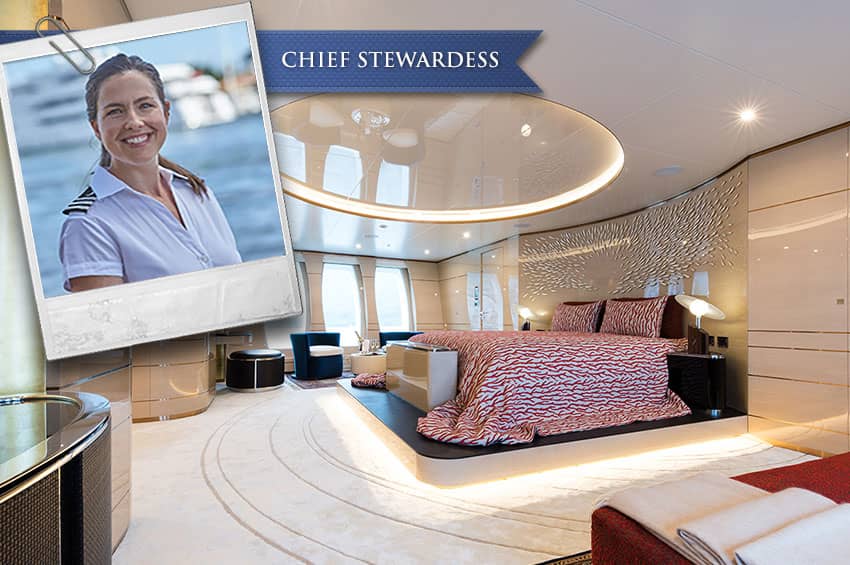
A Day in the Life Series – Chief Stewardess
For a yacht to run smoothly, it requires many working parts, and the interior department is a large component of this. The chief stewardess oversees this department and makes sure all the stewardesses onboard know what their tasks and responsibilities are. The interior department is largely in charge of the guest services whilst they are onboard, and responsible for interior maintenance of the yacht when they are not.
18 Dec 2017
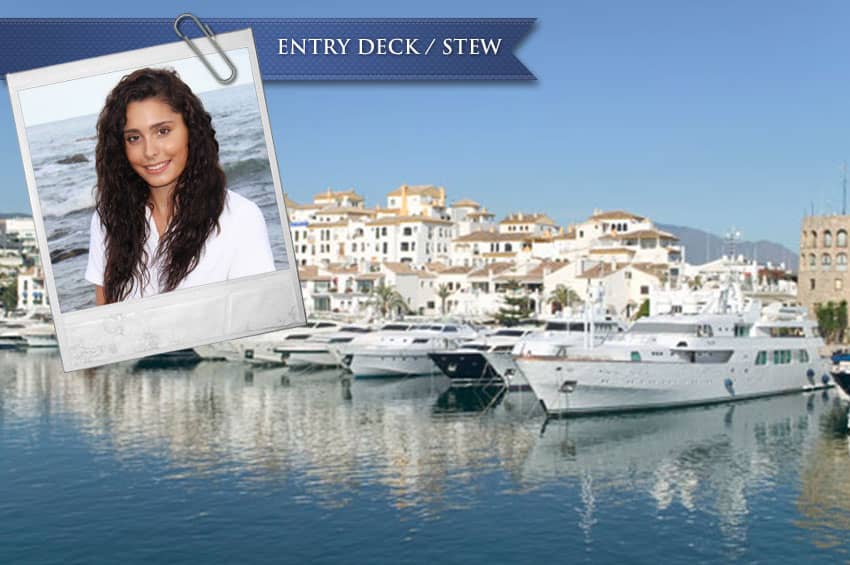
A Day in the Life Of Series - Entry Stewardess
Joining the yachting industry is an exciting and daunting undertaking. In this two part interview we speak with Melanie about why she decided to join the superyacht industry, what her hopes and goals are, and what she has learnt so far as an entry level stewardess.
29 Nov 2017

Yacht Crew Salaries: The Current State
Posted October 12, 2023 by Ashleigh King
The topic of salaries in the yachting industry has gained attention this year, with a growing sense of awareness and discussion. Louisa had the opportunity to speak with several dedicated crew members who have shared their thoughts and concerns about this matter. With the ever-changing economic landscape, it’s crucial to assess whether salaries for yacht crew have adapted to these shifts in a positive direction.
A comprehensive analysis of Dockwalk’s salary surveys over the past several years reveals a rather consistent pattern spanning a 15-year period. Specifically, when comparing salaries in euros for a 50-meter yacht between 2008 and 2023, certain trends emerge. In the case of Captains, the industry average in 2008 ranged from 7,000 to 10,000 euros per month, while this year, it has extended from 7,000 to 15,000 euros per month. Similarly, Chief Engineers in 2008 were earning an average of 5,000 to 7,000 euros per month, whereas in 2023, their earnings range from 5,000 to 10,000 euros per month. It is noteworthy that while the lower-end salaries have remained relatively consistent, the upper-end figures have witnessed a significant increase, aligning more closely with industry expectations.
While the top-end salaries can be attributed to experience and longevity, it remains pertinent to question why the baseline salaries have remained at their current level. This inquiry may stem from the various factors related to job availability and individual crew preferences. It’s possible that, after a period of uncertainty, many crew members are now placing a higher value on the stability of full-time positions over seeking higher pay.
Engaging with numerous crew members who express diverse expectations and requirements underscores the challenge of establishing industry standards, especially considering the growing prevalence of rotational contracts. A notable example illustrates this complexity: I recently met a Captain who was perplexed by the stark disparity in his salary compared to that of a colleague. However, one crucial aspect he overlooked was that his counterpart had been with the same owner for four additional years, underscoring the significance of longevity in this profession.
Furthermore, entry-level crew members are facing their own set of challenges. Green crew are currently being offered a monthly compensation of 2,000 euros, which is nearly the same from 15 years ago when it ranged from 2,000 to 2,500 euros.
While the average monthly compensation for green crew hasn’t seen substantial growth over the past 15 years, it’s essential to acknowledge the rising costs associated with crew housing, food, and travel. In this light, exploring creative solutions to improve the financial well-being of entry-level crew members is a valuable consideration.
While the topic of salary stagnation in the yachting industry has raised concerns, there is also a silver lining. Salaries for experienced crew members have been on an upward trajectory, and the industry is evolving to accommodate different needs and preferences. By focusing on the positive aspects of these changes, we can look forward to a brighter future for all members of the yacht crew community.
Download our Crew Salary Guideline PDFs in Dollars and Euros for more helpful information.
With our presence established in the key yachting hubs worldwide, we stand ready to address all your crew-related requirements. Don’t hesitate to reach out and schedule a consultation with one of our dedicated N&J Crew team members today!

Proud to be part of the MarineMax family
© 2024 Northrop & Johnson
Yacht Captain Salary
How much does a Yacht Captain make? The average Yacht Captain salary is $110,184 as of May 28, 2024, but the salary range typically falls between $89,464 and $126,311 . Salary ranges can vary widely depending on many important factors, including education , certifications, additional skills, the number of years you have spent in your profession. With more online, real-time compensation data than any other website, Salary.com helps you determine your exact pay target.
Search Yacht Captain Jobs
- View Hourly Wages
- Adjust Yacht Captain Salary:
- Select State
- Select City
- Choose Similar Job
- Pick Related Category
- View Cost of Living in Major Cities
Analyze the market and your qualifications to negotiate your salary with confidence.
Search thousands of open positions to find your next opportunity.
Individualize employee pay based on unique job requirements and personal qualifications.
Get the latest market price for benchmark jobs and jobs in your industry.

Search Yacht Captain Job Openings
What does a yacht captain do.
View Job Skills and Competency Data for more than 15,000 Job Titles, 18 Industries, and 26 Job Families.
Our job description management tool- JobArchitect streamlines your job description process. Say goodbye to the hassle of crafting job descriptions.
Yacht Captain Salary in Major Cities
Yacht captain salary by state.
- Connecticut
- District of Columbia
- Massachusetts
- Mississippi
- North Carolina
- North Dakota
- New Hampshire
- Pennsylvania
- Rhode Island
- South Carolina
- South Dakota
- West Virginia
Yacht Captain Salary by City
| City Name | Average Salary |
|---|---|
| $137,729 | |
| $122,634 | |
| $106,327 | |
| $115,582 | |
| $123,516 | |
| $128,694 | |
| $108,751 |
Average Salary Range for Yacht Captain
Average base salary.
Core compensation
Average Total Cash Compensation
Includes base and annual incentives
View Average Salary for Yacht Captain as table
| Average Salary | Average Salary Range | |
|---|---|---|
| Base Salary | $110,184 | $89,464 - $126,311 |
| Bonus | $86,525 | $67,801 - $102,810 |
| Total Pay | $196,709 | $157,265 - $229,120 |
Estimate Salary for Yacht Captain online for free
- Select Relevant job experience
- Select person you report to
- Senior Management
- CEO / Board of Directors
- Select Level of education
- I have not earned a degree
- High School Diploma or Tech Certificate
- Associate's Degree
- Bachelor's Degree
- Master's Degree or MBA
- JD, MD, PhD or Equivalent
- Select number of people you manager
Similar Jobs to Yacht Captain
Comments about yacht captain, yacht captain frequently asked questions.
Learn more about: Compensation Packages , Employee Flight Risk , Gender Pay Gap , Job Openings for This Role
Jobs with a similar salary range to Yacht Captain : Azure Security Engineer
Last Update: May 28, 2024
Working On Yachts
There are currently over 15,000 yachts in the world large enough to require professional, qualified yacht crew and as a result this industry is growing rapidly each year.
A career in yachting can be rewarding, exciting and a wonderful opportunity to travel the world and explore new horizons!
Wherever there is water, you have the potential to go. Traditionally the yachting industry in the Mediterranean runs from April until September and from November to April in the States & Caribbean. Having said that, the possibilities are endless with many yachts circumnavigating the world.
Yachting is an eye opening, ultimately fun industry that demands hard work, perfection and attention to detail. We work with yacht crew every day and have a deep insight into what new crew should do to make the most of their career. Here are our top ten tips for starting out.
You cannot work on board a luxury yacht without getting your basic qualifications first. Bluewater offers a full range of crew training courses for those just starting in the industry:
- STCW 95 Basic Training (Europe) 5 Day Course
- Powerboat Level II 2 Day Course
- Interior Introduction 3 Day Course
- AEC 1 5 Day Course
We have a sample copy and lots of relevant advice on creating your first yachting CV within our 'Your CV' section.
Certain times of year are more favourable for new crew looking to join the industry. If you are going to Antibes or Palma, we advise end of March/April. Fort Lauderdale is different in that it is sunny most of the year, however there is a peak recruitment season around November each year.
In every yachting hub you will find english speaking bars and cafes filled with yacht crew. Make sure you go and explore to build your network within yachting. Although global, it is a small industry so make sure to present yourself professionally.
Finding your first position in yachting is the hardest. Make sure you are dock walking, looking for day work opportunities and handing out your CV. You may find that one day's work leads to a permanent role or other job interviews.
Read websites, follow yachting news, learn from other crew who were in your 'deck shoes' a few years ago. Good examples of yachting websites & magazines are:
- Bluewater bluewateryachting.com
- Dockwalk dockwalk.com
- The Crew Report thecrewreport.com
- The Triton thetriton.com
Apply for jobs, manage your course bookings and sign up for events.
You can buy pay as you go SIM cards either in newsagents or specialised telephone shops around the Mediterranean. This will help to save you money when job hunting!
Captains check Facebook and Twitter pages before interviews. Make sure any public images of you are professional and will not reduce your chances of employment. Once employed be sure to avoid any posts about your yachts, current location and inappropriate images.
A smart, professional appearance will win over shorts and a beach top.
The most important aspect when you are looking for work is to make sure your CV is up to date, well written and includes any relevant experience that you might have.
It is best to emphasize any hospitality experience or customer service skills you may have had, such as waitressing, hostessing, silver service, bartending, cooking, nanny/au-pairing, babysitting, flower arranging, cleaning and/or laundry experience.
Should you wish to join the engineering department, make sure you include all mechanical experience and qualifications, including all work done in refrigeration, air conditioning, work with engines, and any electrical work, electronics or AV/IT.
The most important aspect to include is any recreational sailing experience you may have had. If you are also qualified or experienced in woodwork or carpentry, have painting, polishing, varnishing know-how, then that is also great. In addition any diving, sailing, fishing, any water sports background are all fantastic skills that are easily transferable.
We deal with a great multitude of chef positions, ranging from crew chef to head chef. Most positions will require some form of culinary training, however some crew succeed in entering this department through the stew/cook route on a smaller yacht.
When filling in your online profile with us, make sure to only select positions that you are qualified to do onboard. Selecting more than 3-4 positions on your profile can confuse potential employers and effect our search results.
Your CV should be no more than two sides of A4, including your photograph (in colour, face on, without sunglasses).
Your CV should be in a word format to ensure it can be opened easily by all employers.
List all recent contact information, references and work history.
Including a personal statement, along with a clear objective can help distinguish you from other candidates and helps prospective employers grasp your long term goals.
Don't give employers an excuse to dismiss your CV, review and spell check it!
Salary Guidelines

Knowledge is power and the more you research, the more informed & on the ball you will be.
Make sure you have a printed copy of your CV with you and always arrive early and dressed in a smart way. Research the yacht, make yourself prepared & don't be afraid to ask questions.
The key to getting your first job is to network! Always carry a copy of your CV with you.
Remember the industry is a tight, professional network therefore it is crucial to communicate with others, walk the docks, distribute your CV and register with crew agencies. Bluewater is one of the longest-established crew agents - we have been finding people yacht jobs since 1991!
Keep the agencies up to date! Always make sure your profile has the correct location and contact numbers for you so we can get hold of you when we have the perfect role for you.
Your profile is essential to us finding you work, both now and in the future. We rely on the information you input to match you to the right jobs, so please make sure it is up to date and at least 85% complete. We receive thousands of vacancies each year, and search our database for the best candidates for each one... You will hear from us more often if you are checking in regularly! Once you find work you can set your profile to 'Not Available'.
Entertainment
The 'Below Deck' Crew Works Hard For Their Pay

It's lucky to find a well-paying career that doubles as a passion, and many people have to settle for one or the other, even reality stars. So how much does the crew of Below Deck make? They all seem to love the sea, though their salaries don't compare to those of the rich and famous people who charter their services. But being a steward or a deckhand seems like a great job. Flexible schedules, plenty of time outside, and the shot at some major tips all combine to make this a perfect career path for anyone who loves boats and can manage service with a smile.
The crew that's actually featured on Below Deck succeeds and fails to various degrees, but their profession is one that takes a certain combination of skills and makes Captain Lee's plane ticket policy totally necessary. Once you hire someone for a charter, you're stuck with them until it ends. If you've ever been worried about your performance review at work, at least be thankful that you're not marooned at sea with an angry boss. Anyway, the actual salaries vary depending on the different jobs available to the crew. But the best way to ensure that you get paid well is to provide amazing service, because that $1,000 bonus at the end of each charter is what everyone is working towards.
Yacht Captain: Lee

According to a reference guide by Luxury Yacht Group, which provides salary ranges for all yachting roles quoted here, a captain can make from $7,000 to $20,000 a month, depending on experience and the size of their yacht. The Eros is 160 feet (on the large side), while Captain Lee's Bravo bio says he has 20 years of experience, and has had his captain's license since he was 35. So he probably makes closer to that $20,000 figure.
Chief Stew: Kate

Kate, as the chief stew, takes on a significant amount of work above and beyond the normal duties of a steward. And she's had years of experience, so I'm willing to bet she maxes out LCG's estimate of $9,000 a month.
Bosun: Eddie

Back on the deck crew, a bosun will take home somewhere in the range of $3,000-$6,000 a month, which seems low compared to the amount of responsibility Eddie's taken on managing the deck crew, though he could have a unique rate due to that.
Engineer/Deckhand: Don

Don seems pretty insistent on the difference between an engineer and a deckhand, especially because he feels that an engineer usually doesn't have to listen to the bosun. Luxury Charter Group has an estimate for exactly that role, proving it must be somewhat common in the yachting community. Turns out Don is probably making between $3,000-5,000 a month.
Second Stew: Amy

As Kate's second in command, Amy, qualifies for somewhere between $2,500 and $5,000 per month, depending on her experience and what she was able to negotiate, because Amy's ability to sweet talk must make it easy for her to coax even the toughest yacht hiring service into a few dollars more.
Third Stew: Rocky

She probably makes about $2,500 per month, which could be equal to other crew members depending on where they fall in their various salary ranges.
Deckhand: Connie/Emile

Connie might be the hardest working person on the ship, and yet her estimate is $4,000 a month, based on LCG's cross section of yacht size and experience. Emile has less experience than Connie, so he's probably making closer to $2,500 per month.
Ship Chef: Leon

Leon is an incredibly experienced chef, but he hasn't been getting along with the rest of the crew because he doesn't have the same yachting experience as many of the others. But that doesn't stop him from earning up to $12,000 a month, which may explain his "F the haters" mentality so far. Let's hope that figure is enough to bring Ben back.
Basically, when a yachtie is working, for the most part they are making a good a salary. But as Below Deck has demonstrated, the hours can be very long, charters can be scarce at certain parts of the year, and getting fired can happen at any time. Build experience and work on a large boat of a challenging size, however, and you will find that the life of a charter yacht crew member can be a great way to make a living.
Images: Virginia Sherwood/Bravo (9)
Back to Blog
Captains Clients Superyacht Industry Insights
Superyacht Captain salary survey 2023 18 December 2023
captain salary survey crew salary survey superyacht captain superyacht salaries yacht captain
In our biggest salary survey yet, we have uncovered detailed insights into Superyacht Captain salary and leave packages.
Almost 300 Captains responded across a range of yacht sizes from sub-30m to 100m+. In addition to average pay and leave, pay rise and bonus activity, the 20+ page report also compares Captain and Chief Officer experience, ticket level, longevity onboard and comparisons to our 2020 and 2022 survey findings.
Some top-level statistics are:
- Every yacht bracket has seen a salary rise since 2020 and 2022.
- Full rotation is also increasing and becoming more prevalent on sub-50m yachts, with an 11% decline overall in Captains with less than 59 days leave.
- Two-fifths of Captains receive an annual pay rise, although this is not part of their contract.
- 38% receive a 13th-month bonus, but random and unpredictable bonuses are more commonplace.
- 70% of Captains have Master 3000.
- Exactly half of the Captains who responded have more than 10 years’ experience in the role and 32% were Chief Officers for 3 to 5 years prior.
- A third have been Captains on their current yacht for more than 3 years.
- Flight allowance improves with yacht size, with 49% of Captains receiving Business Class flights as part of their package.
- The average age at which respondents first became Captain is 32.5 years old.
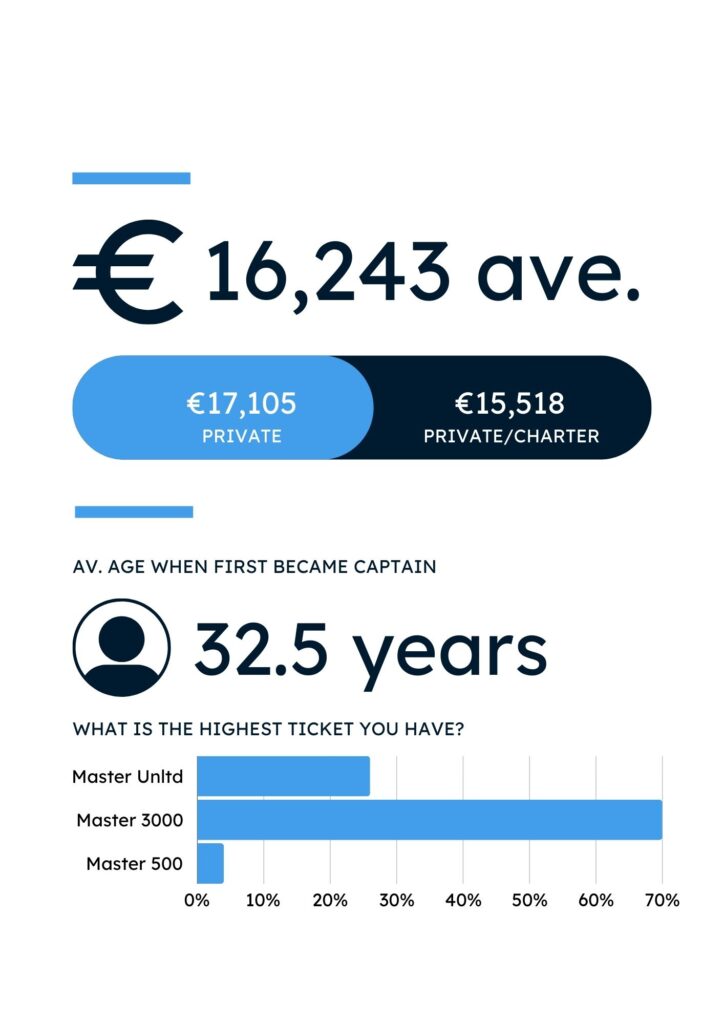
The full report contains a comprehensive analysis of salaries and leave in each yacht size bracket and also compares full time with rotational roles, as well as explores any correlation between experience and type of ticket.
Simon Ladbrooke, Captain Consultant at Quay Crew, commented:
“In our most detailed salary report to date, we have gained an insight into the real-time compensation Captains receive, broken down by yacht size and with several other comparables too.
“A key takeaway this year is that, despite a slight decline in salaries between 2020 and 2022, the average monthly pay is now higher across all size brackets, representing a median 6.75% increase.
“Time for time rotation has also grown in popularity on all sized yachts, with the exception of <39m yachts which are all full-time at the moment.
“By gathering Chief Officer experience as well as longevity on their current yacht, we can surmise that onboard promotion is on the rise. The average age that someone becomes Captain is now older and the number of years of experience as Chief Officer is higher, suggesting the transition is also taking longer.
“This is undoubtedly down to there being more competition amongst candidates and it being more difficult to make that initial step up.
“Yet, almost three-quarters say it took them less than 6 months to get their first Captain role. This could be, along with the extensive CO experience demonstrated in this survey, largely down to onboard promotion.
Having said that, we were very surprised at this statistic as it doesn’t match at all with our experience. Often, Chief Officers are looking for several years before they finally get their opportunity. It’s something we definitely want to explore further in another survey.”
All HOD salary surveys are available on our client portal, which you can request access to here.

About the author
Simon Ladbrooke
Compassion at christmas: the yachting edition, interview questions to ask as a captain candidate, keep up to date sign up to the quay crew newsletter.
I have read the Terms & Conditions and would like to be added to the mailing list
- Superyacht Recruitment Services
- Superyacht Captain Recruitment
- Partnerships
- Meet the Team
- Work for Us
- Land-based Recruitment Services
- Private Residence Recruitment
- Current Vacancies
- Crew Resources
- Candidate Login
- Candidate Registration
- Client Login / Register
- Candidate Login / Register
Got a Question?
Complete our short form for a prompt response and world class tax advice.
Yes please contact me regarding mortgages
By selecting this, you agree to the Privacy Policy .
Sign in to your account
Yacht crew tax & financial information - your ultimate guide.

Image source: https://pixabay.com/photos/euro-banknotes-hand-holding-money-867410/
Whether you’ve worked in yachting only a few months or many years, it’s guaranteed you’ll have questions surrounding finances, tax obligations and personal concerns to get the most from your off shore income.
Whilst many in the yachting industry find themselves in the unique position of having a high income and low expense lifestyle, a career in yachting can often be fruitful but short.
This makes it all the more important to begin arranging your affairs to maximise the benefit of this income now.
By taking a few simple steps, you can ensure you feel the long-term benefit of the unique position and secure a better future.
In the following chapters, we outline 7 key considerations whilst being employed on a ship.
Simply click on the links below to be taken straight to the chapter that interests you, or read the whole “ultimate guide” to be as fully informed as possible:
Yacht Crew Salaries
Living expenses, bank accounts, savings & investments, social security, tax obligations.
Roles within the yachting industry often come with a generous salary.
Whilst a deckhand cannot realistically expect to earn as much as the captain, it’s usually said everyone on board will do pretty well for themselves.
Your salary will be dependent on a number of factors including:
- type of vessel
- past experience
- qualifications
- end of season bonuses
- performance based incentives
- the vessel’s route
- your relationship with the owner
- guest & charter tips
It’s not uncommon for crew to be offered an end of season bonus, which many put aside into savings or choose to invest.
SY Ranger for example, famously had one of the best retention packages in the industry, where crew received an additional months pay for every year of service.
The following infographic below gives a fairly good measure of the salary ranges expected by various jobs on board a super yacht:

On top of your salary, you can often expect your living expenses to be covered whilst on board.
The fact that your employer covers food, accommodation and other essentials, often leaves crew with a large disposable income.
Again, there are dependent factors, but it’s not uncommon for experienced crew members to have travel expenses to and from the yacht reimbursed as well!
For those taking their firsts steps into yachting, having the right type of bank account to be paid a salary into should be a top priority.
Being paid wages into a domestic, single currency bank account can often be a huge mistake.
Retail banks at home will generally not accept multiple currency deposits and you may find you lose money to the bank through poor exchange rates or high conversion fees.
For this reason, the savviest employees open an offshore multi-currency account with a provider such as the following:
- Standard Bank
These accounts are designed to hold multiple currencies and are great for paying salaries into.
However, you’re advised to learn more about why leaving your hard-earned cash in one for an extended period is not advised, by reading our article about International Account Myth Busters .

Image source: https://pixabay.com/photos/piggy-bank-money-cow-dollar-bill-3297061/
You’ll find most employers provide medical & health insurance to cover costs for injury or sickness, which are vital whilst overseas.
This provision is assumed to be fairly standard throughout the industry, but it’s not always the case and is worth taken into account before you accept any role.
If you fall ill or become injured whilst away and are not covered by your employer’s insurance policy, you may find overseas medical bills very expensive.
Even if you’re covered by your employer’s health & medical policy, there’s other forms of insurance you may need to consider.
For example, long-term absences due to sickness or injury are unlikely to be covered by sickness pay.
In order to guard against this, you should consider a payment protection insurance plan, which covers you for loss of earnings during your time off.
Various people take differing approaches to how they save and invest their money whilst employed in the yachting industry.
For example, there’s a great number who take advantage of the well paid lifestyle by investing large sums in stocks & shares, property or many other options as early as possible, to enable them to leave the industry quickly.
There are others however, who choose to leave thousands of pounds worth of currency sitting in offshore accounts, gaining zero interest!
Remember - leaving money in an account accruing 0% interest for an extended period of time actually means the value of the savings will decrease due to rises in inflation.
If this is a situation you find yourself in, you are advised to act quickly.
Read our article to learn 5 ways to make your end of season savings work and avoid currency depreciations.
For social security matters, each jurisdiction has different parameters regarding your obligations to pay and the benefits you receive in return.
Some countries like France, insist that you must contribute if you spend more than 181 days on a vessel in French territory, whilst others give you the option to make voluntary contributions if you wish to.
Depending on the jurisdiction, your contributions can cover a number of benefits, which could include the following:
- State pension
- Payments to support you when out of work through sickness etc.
- Widows/Widowers benefits
- Maternity/Paternity payments
Due to recent changes in the French system, social security is a hot topic of conversation amongst yacht crew and yacht owners.
As a consequence, many have avoided French territories for this precise reason.
Under the new system, you’re obliged to make payments if you qualify under either of the following tests:
You will be obliged to contribute if you or your vessels spend more than 181 days in France or French waters in any calendar year.
You will be obliged to make contributions if you qualify as a French resident for tax purposes.
As it stands, it is the responsibility of the captain or vessel owner to ensure all crew are compliant with French social security laws.
So you should be notified if you’re liable, and may find contributions are taken by your employer at source.
If you think this applies to you, you can read more around the subject of common French social security questions in our recent blog post.

Image source: https://pixabay.com/photos/money-bills-calculator-save-256312/
For many years, crew all over the world have been being paid into offshore accounts, with tax authorities being none the wiser.
Unfortunately, this is no longer the case.
With the introduction of the Automatic Exchange of Information and Common Reporting Standard in 2014 , any participating tax authority can now request your bank gives them full details of all your holdings, both onshore and offshore.
For this reason, it has become all the more important that you have a strong understanding of your residency position, which will dictate your obligations in declaring income.
If you are ruled to be tax resident of any country, you are obliged to declare your income from any source worldwide, which of course includes your yachting salary.
If you become the subject of an investigation and are found to have failed to declare income whilst being a tax resident under the laws of a relevant jurisdiction, most authorities will expect payment of penalties and fines or interest for late payment.
The only sensible course of action is to fully assess your residency position and voluntarily disclose your income from work and investments, before any authorities ask.
By doing so, you’re demonstrating that you’ve made every effort to remain tax transparent and to fulfil your obligations.
Most authorities will take a much kinder view on those that do, than those that don’t!
Each jurisdiction has different tax laws, with some being more forgiving than others when it comes to taxation placed on your income from yachting.
Below we summarise the differences for each including the UK, USA, New Zealand and Australia:
UK Yacht Crew Tax
The UK system is one of, if not the most forgiving in terms of tax on income from yachting, and as such is one of the most appealing tax residencies.
Through the HMRC’s Seafarers Earnings Deduction (SED), UK yacht crew can declare their income from yachting with a 100% exemption from tax.
To gain 100% tax exemption, you must qualify as a UK tax resident (or EEA resident with no other tax residency) under the Statutory Residency Test, with the special circumstances of seafarers accounted for in the legislation.
Whilst there’s other parameters you must adhere to, the most important one to observe in order to qualify is the limit of 183 days spent onshore in the UK in any rolling 365-day period.
For more information, read our detailed article covering all aspects of the Seafarers Earnings Deduction tax exemption.
US Yacht Crew Tax
The US tax system offers a tax-free amount, which can be earned by US tax residents through the IRS’ Foreign Earned Income Exclusion (FEIE).
This is adjusted annually with earnings up to $104,100 qualifying for the 2018 tax year.
In order to qualify under the FEIE, you need to work and live outside the US and pass one of two tests:
a) Bona Fide Residency Test
You can qualify as a bona fide resident of a foreign country if you reside there for a period, which covers one whole tax year.
The US tax year runs from 1st January – 31st December.
Leaving the country for vacations will not affect your qualification however, you must not submit paperwork notifying them of your presence as non-resident.
b) Physical Presence Test
To qualify for FEIE under this test, you must be present in a foreign country for at least 330 days in any period of 12 consecutive months.
Any declared days spent overseas must cover the entire 24-hour period of said days, so departure and arrival days for example don’t count.
It’s also important to remember that under FEIE, a day spent in international waters also counts as a US day.
Australian Yacht Crew Tax
Australian crew are in the unfortunate position of suffering some of the harshest and most outdated residency laws you’ll find anywhere in the world.
You’ll be subject to the 3 statutory residency tests below:
a) The Domicile Test
You're considered an Australian resident if you’re domicile (the place that is your permanent home or place of your fathers’ birth) is in Australia.
To overcome this test, you must set up a permanent home overseas.
b) The 183 Day Test
If present in Australia for more than half the income year, whether continuously or with breaks, you are said to have a constructive residence in Australia.
To overcome this rule, you need to establish that your usual place of residence is outside Australia and you have no intention of taking up residence back home.
Under this rule, a traveller could feasibly be ruled tax resident unless they can evidence that they have a home elsewhere and have no intention to return to Australia to live.
c) The Superannuation Test
You’re considered a resident of Australia if you are still contributing to a superannuation scheme.
For more information, read part one of a two-part series on Australia’s tax laws and yachting .
New Zealand Yacht Crew Tax
New Zealand residency tax laws are simple and easy to work with.
If you wish to establish a position of non-residency and not have to pay tax on your earnings, you’ll need to qualify via the following tests:
a) 325-Day Rule
You must first establish an initial qualifying period for non-residency of 325 days outside the country in any 365-day period.
These days do not have to be consecutive, so you’re welcome to visit home at any point.
But it’s important that you keep good records of your whereabouts and movement including flight stubs, train tickets and even receipts as evidence of your time spent overseas.
b) 183-Day Rule
Once you’ve established your initial qualifying period of 325 days outside New Zealand, you can then maintain your qualification by not spending any more than 183 days in the country in any 365-day period.
If you break the 183-day threshold, you will need to re-qualify by spending 325 days overseas in any 365-day period.
c) Permanent Place of Abode (PPA)
If you wish to establish non-residency of New Zealand, you must not have a home which is permanently available to you to live in the country.
Under this rule you may still be ruled resident, even if you have spent the necessary time overseas.
A room, which can be used on a temporary basis at a friend or family members’ house, will not be considered a PPA, nor will an investment property in which you don’t spend time.
Speak to Us or Comment!
As you can see, tax residency laws vary across numerous territories, so it's important to know your position early on and what your obligations are.
We'd love to know your thoughts on this article or any questions you might have.
Just leave a comment in the section below or alternatively, contact us if you need professional advice on your yachting income tax obligations.
Any advice in this publication is not intended or written by Marine Accounts to be used by a client or entity for the purpose of (i) avoiding penalties that may be imposed on any taxpayer or (ii) promoting, marketing or recommending to another party matters herein.
Before you go...
You're about to visit a page on our legacy site. We're currently in the process of updating all our tax tools and while this page is still active please return to the main Marine Accounts site after completition.
Refer a friend and receive £50!
Upon successful completion of the referral the cash will be transferred to you.

COMMENTS
The Results of the 2023 Salary Survey. Our annual salary survey provided some unprecedented insights to what captains and crew earned in 2023. The yachting industry is slowly returning to normal in the wake of the pandemic. Yachts are back to work around the world and many new ones are in the pipeline thanks to the surge in popularity the ...
Even though these salaries may give you a reference point, we would like to inform you that all yachts are different, equally as their owners. These salary rates are based on the current state of the employment market in yachting in 2023. Real wages always vary depending on the candidate's experience, training, certificates and additional skills.
Yacht Crew Salaries. The crew salaries reflected below have been derived from placement records and job orders for both power and sail, reflected as an average, received by Crewfinders within the past year and may change without notice. Salaries reflect increase with the size of the vessel. Variations occur with the amount of owner/guest use ...
The Second and Third Engineers report directly to the Chief Engineer. They assist in maintaining all mechanical and electrical operations of the yacht. 2nd Engineer. €3,000 - €10,000. 3rd Engineer. €2,500 - €6,500. Sole Engineer. €3,500 - €12,000. Motorman.
Apr 13, 2023. 2 min read. YPI CREW, a leading yacht crew recruitment company, has released its 2023 Yacht Crew Salaries Report following a positive and fast-paced year in yacht crew placement. The report outlines trends in the industry and emphasizes the importance of flexibility in attracting top talent. 2022 marked a significant shift in the ...
Every yacht operates under different guidelines with different roles and responsibilities and we do see a wide range of salaries as being valid for identical job titles. Salary ranges listed are per month. CAPTAIN CAPTAIN SIZE OF VESSEL SALARY RANGE JOB DESCRIPTION & REQUIREMENTS: Senior Master 170ft - 200ft + $12,000 - $25,000+
Specifically, the salaries were 7,000 to 8,000 euros ($7,600 to $8,700) vs. 3,500 to 4,000 euros ($3,800 to $4,400). Since on-deck positions range from captains to entry-level deckhands, yacht crew salaries here span a wide range. Notably, captains for 328-foot-plus (100-meter-plus) megayachts can get bonuses on top of an average 18,000 euros ...
May 25, 2023. It's no secret that the impressive yacht crew salaries attract most people into the exclusive yachting world. Junior deckhands or stewardesses can earn starting salaries of $3000 per month. With a few years of experience and some courses to back you up, this amount moves up towards $4000-$4500 per month!
Salary structure for yacht crew is key to understand when wanting a career in the yachting industry. See the following breakdown of positions and their corresponding average monthly salaries: Position. Monthly Salary (Average) Captain. $10,000 - $20,000. First Officer. $6,000 - $12,000. Chief Engineer.
Salaries here need to be modulated in accordance with the type of rotation offered, 5:1; 3:1 or 2:2 for example. There may be several different rotational schemes on a particular yacht, 5:1 for the junior crew, 3:1 for the intermediary position and full rotation for positions of responsibility.
Crew must have a space to sleep, food, and all the basics that any employee needs. Large yachts have space reserved for crew, and owners looking for quality crew should provide good working and living conditions. Your crew takes care of you, and you should take care of them. ... Reports to: The yacht owner. Salary Range: $6,000 to $22,000.
Depending on various factors, the captain could be paid $4,200 to $15,800 per month. Although this an extremely high pay rate, it requires decades of experience typically. Being in charge of the safety of passengers, crew members and potentially a $50 million yacht is serious business!
Find accurate and up-to-date salary data for yacht crew positions on the Yacht Career Hub website. Get a snapshot of current industry packages for all possible positions onboard. ... Search Salaries. Select for position, size and contract type to estimate the industry standard salaries and various conditions. Position Onboard. Yacht Size. Under ...
The salary guidelines are utilized by an array of industry professionals worldwide as a reliable benchmark for yacht crew salaries. This active data is taken from the thousands of live crew profiles who are placed on yachts by Luxury Yacht Group every year. New members joining the industry turn to the websites 'Department Descriptions' to learn the essentials before taking the plunge.
The stewardess who demonstrates skill, experience and credentialing that match the yacht program can command an annual salary and benefit package over $100,000. Stewardess positions on yachts pay from $24,000 - $108,000 annually based on the factors of vessel length, stewardess experience, and responsibilities.
Specifically, when comparing salaries in euros for a 50-meter yacht between 2008 and 2023, certain trends emerge. In the case of Captains, the industry average in 2008 ranged from 7,000 to 10,000 euros per month, while this year, it has extended from 7,000 to 15,000 euros per month.
Base pay for yacht stewardesses depends on experience, qualifications, and the yacht's size. Entry-level stewardesses earn between $3,000 to $4,000. If you're considering a career as an entry-level yacht stewardess, it's important to understand the range of salaries that are typically offered in this field.
The average Yacht Captain salary in the United States is $110,184 as of May 28, 2024, but the salary range typically falls between $89,464 and $126,311. ... Adjust Employee Salary . Individualize employee pay based on unique job requirements and personal qualifications.
There are currently over 15,000 yachts in the world that require qualified crew. A career in yachting industry can be rewarding, exciting and a wonderful opportunity to travel the world and explore new horizons! ... Salary Guidelines. Position. Less than 30m. 30-40m. 40-50m. 50-70m. 70-80m. 80-100m+ Captain. €4500-6000. €4500-9000. €9000 ...
Yacht Captain: Lee. According to a reference guide by Luxury Yacht Group, which provides salary ranges for all yachting roles quoted here, a captain can make from $7,000 to $20,000 a month ...
In addition to average pay and leave, pay rise and bonus activity, the 20+ page report also compares Captain and Chief Officer experience, ticket level, longevity onboard and comparisons to our 2020 and 2022 survey findings. Some top-level statistics are: Every yacht bracket has seen a salary rise since 2020 and 2022.
UK Yacht Crew Tax. The UK system is one of, if not the most forgiving in terms of tax on income from yachting, and as such is one of the most appealing tax residencies. Through the HMRC's Seafarers Earnings Deduction (SED), UK yacht crew can declare their income from yachting with a 100% exemption from tax.
The average Viking Yacht salary ranges from approximately $42,651 per year (estimate) for a Warehouse Employee to $118,252 per year (estimate) for a Project Manager. The average Viking Yacht hourly pay ranges from approximately $19 per hour (estimate) for a Data Entry Clerk to $60 per hour (estimate) for an Engineering .